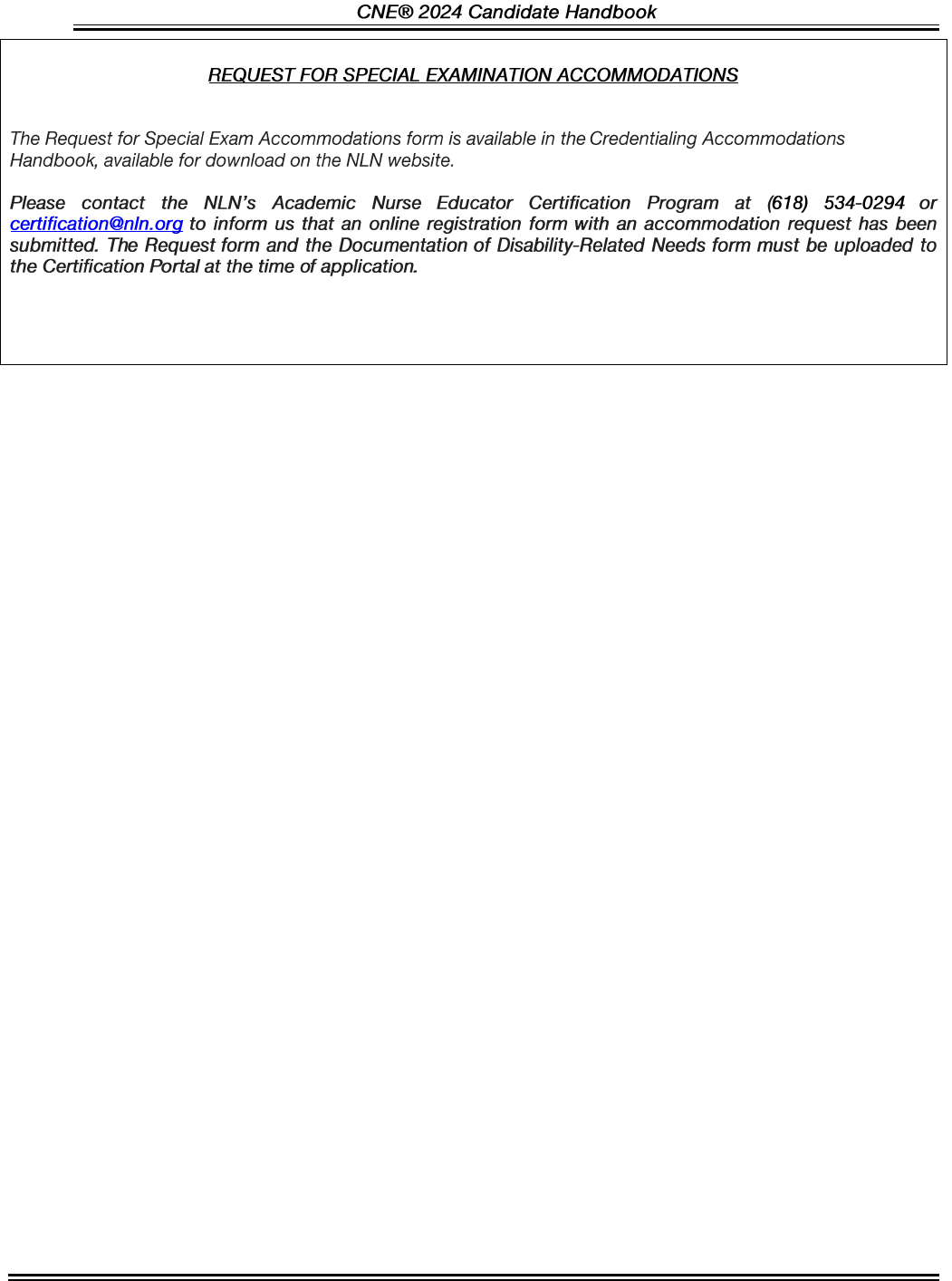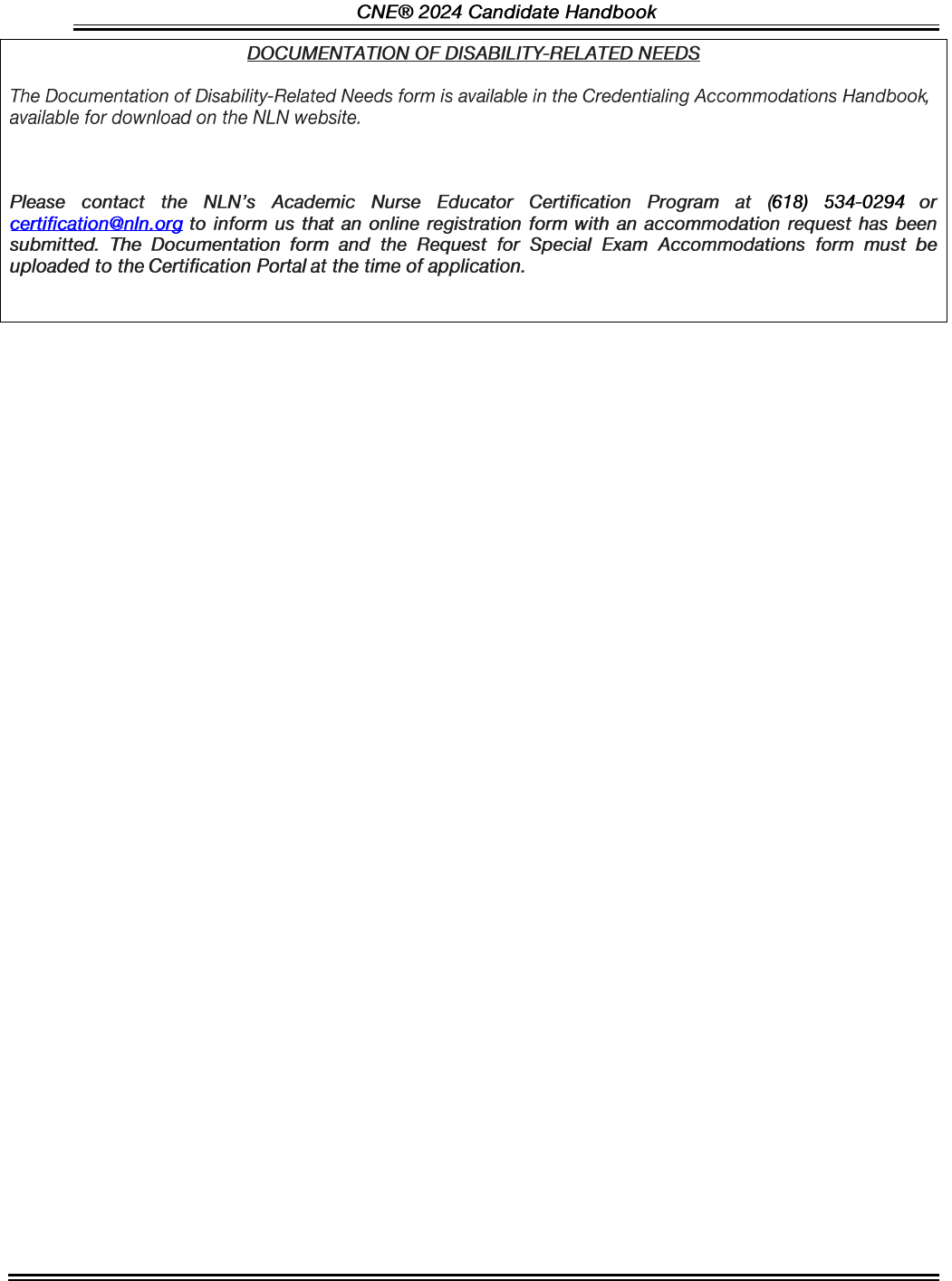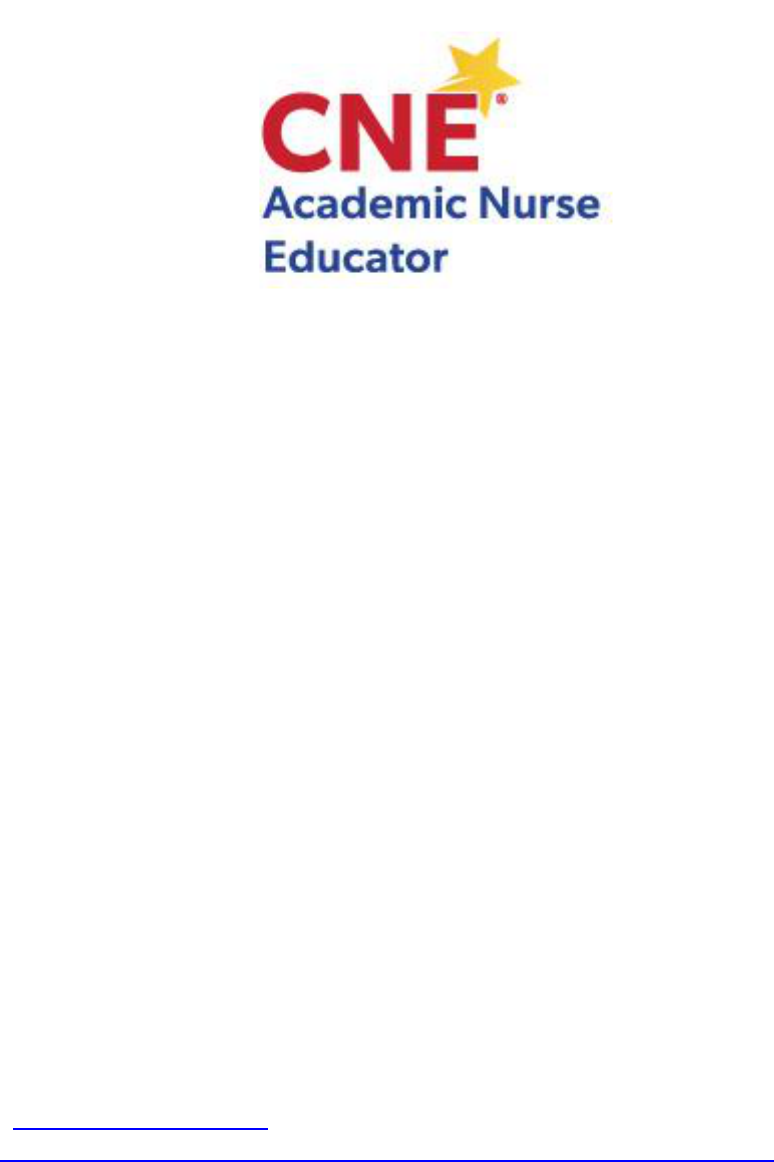
Certified Nurse Educator (CNE®)
2024 Candidate Handbook
Revised June 26, 2024
Administered by the National League for Nursing’s
Academic Nurse Educator Certification Program
National League for Nursing
Academic Nurse Educator Certification Program
2600 Virginia Avenue NW, 8
th
Floor
Washington, DC 20037
Phone: (618) 534-0294
Email: certification@nln.org
Web: www.nln.org/certification/Certification-for-Nurse-Educators/cne
© 2024, National League for Nursing. All rights reserved.
Copying and distribution of this document or any parts of this document are expressly prohibited.
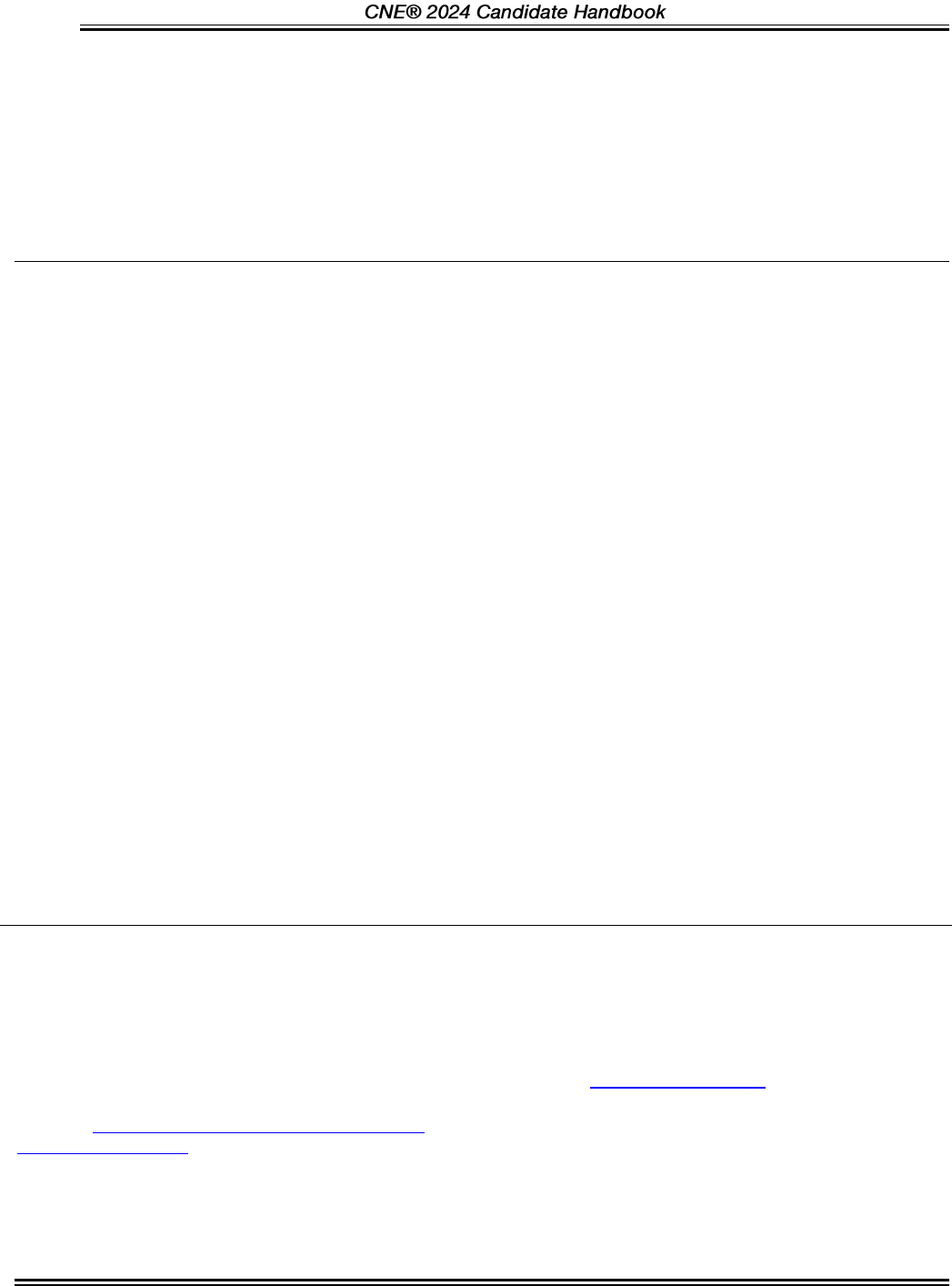
1
PLEASE NOTE that the Candidate Handbooks are copyrighted material developed and owned by the
NLN. The document is downloadable for individual use. Use of the handbooks for commercial
purposes is strictly prohibited.
It is essential that candidates keep the handbook readily available for reference until they have completed the
examination. Candidates are responsible for knowing its contents.
Copying and distribution of this document or any parts of this document are expressly prohibited.
Contents
General Information ....................................................... 2 - 15
Value of Certification ...........................................................2
Goals of CNE® Certification ...............................................2
Definition of Academic Nurse Educator Practice ................2
Eligibility Requirements ......................................................3
Statement of Nondiscrimination…………...…………………4
Certification .........................................................................5
Recertification/Renewal ......................................................5
About the CNE® Examination ............................................5
Test Format ........................................................................6
Examination Test Blueprint .................................................6
Test Blueprint ....................................................................6
Detailed Test Blueprint .......................................................7
Preparing for the Examination……………………... ……...12
Helpful References ...........................................................13
Sample Questions ............................................................15
Applying for the Examination ................................ 17 - 18
Fees .................................................................................17
Verification ........................................................................17
Agreement of Authorization & Confidentiality ...................17
Confirmation of Eligibility ..................................................18
Examination Reapplication ...............................................18
Special Arrangements for Candidates with Disabilities .....18
Examination Administration .................................. 19 - 20
Scheduling an Examination .............................................19
Examination Times and Days ...........................................19
Assessment Center Locations .........................................19
Examination Appointment Changes .................................20
Missed Appointments and Cancellations ..........................20
Inclement Weather, Power Failure or Emergencies..........20
Taking the Examination .........................................21 - 22
Identification .................................................................... 21
Security ........................................................................... 21
Practice Examination ...................................................... 21
Timed Examination ......................................................... 21
Examination Restrictions ................................................. 22
Copyrighted Examination Questions ............................... 22
Misconduct ...................................................................... 22
Live On-Line Proctored Test Administration……... 23
Following the Examination ................................... 24 - 25
Scoring ............................................................................ 24
Determining Pass/Fail………………………………………24
Score Report ................................................................... 24
Requests for Hand Scoring ............................................. 24
Scores Cancelled by NLN or Meazure Learning ............. 25
Candidates Who Pass the Examination .......................... 25
Candidates Who Do Not Pass the Examination .............. 25
Confidentiality.................................................................. 25
Policies ...................................................................26 - 27
Request for Appeal ......................................................... 26
Refund Policy .................................................................. 26
Extending Testing Eligibility ............................................ 26
Ethics Case Procedures .................................................. 27
Authorized use of CNE ................................................... 27
Special Forms........................................................ 28 - 30
Request for Special Examination Accommodations ........ 28
Documentation of Disability-Related Needs .................... 29
Withdrawal of Examination Request …………………... 30
How to Contact the NLN:
National League for Nursing
Academic Nurse Educator Certification Program
2600 Virginia Avenue NW, 8
th
Floor
Washington, DC 20037
Phone: (618) 534-0294
Email: certificat[email protected]
Website: www.nln.org/certification/Certification-for-
Nurse-Educators/cne
How to Contact Meazure Learning:
P.O. Box 570
Morrisville, NC 27560
Phone: (919) 572-6880
Email: candidatesupport@meazurelearning.com
Website: meazurelearning.com
Meazure Learning is an independent testing agency
that provides testing and measurement services to the
ANECP.
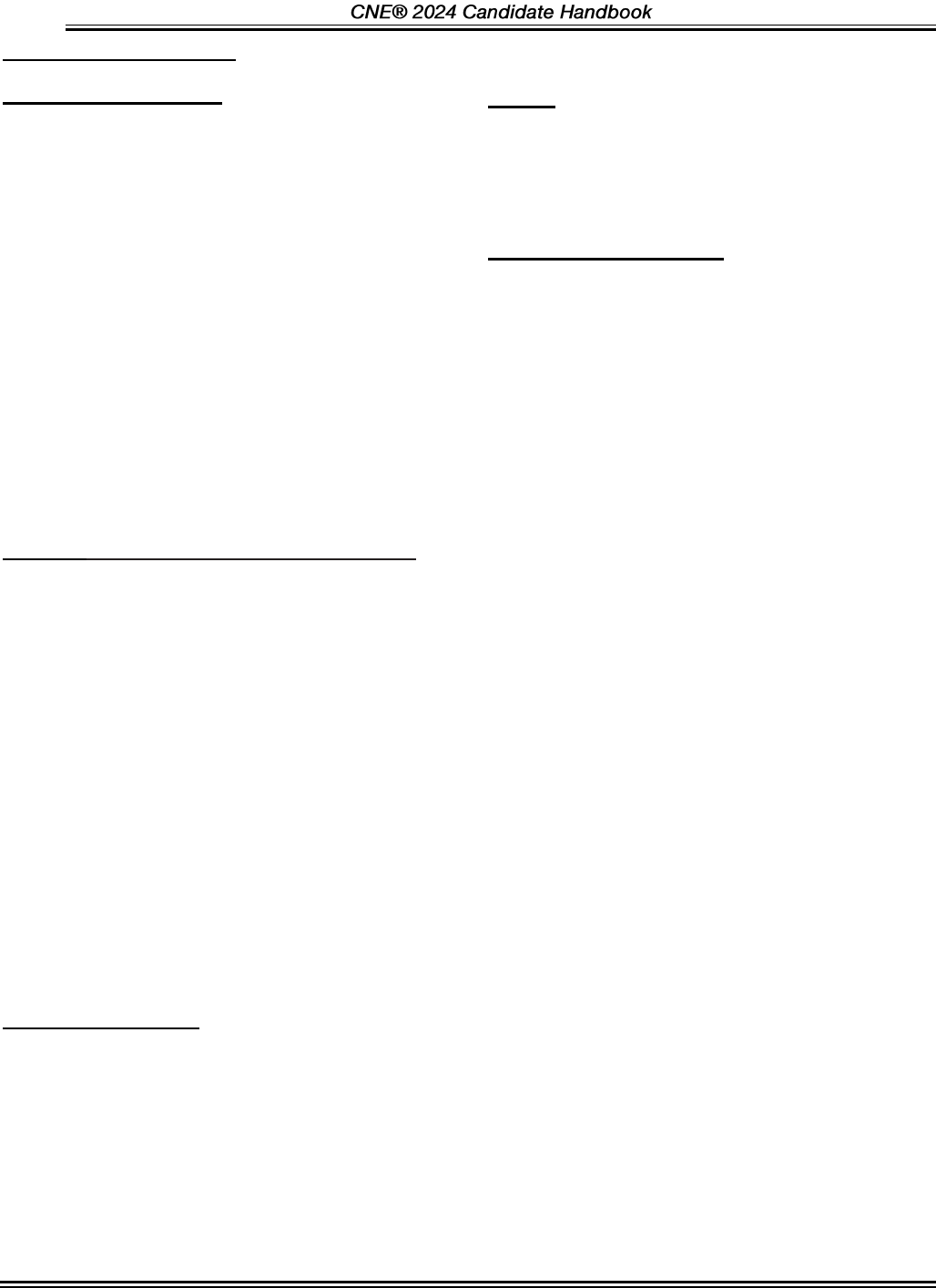
2
GENERAL INFORMATION
The Value of Certification
Certification in any field is a mark of professionalism.
For academic nurse educators, it establishes nursing
education as a specialty area of practice and creates
a means for faculty to demonstrate their expertise in
this role. It communicates to students, peers and the
academic and health care communities that the
highest standards of excellence are being met. By
becoming credentialed as a certified nurse educator,
you serve as a leader and a role model. Certification
is the mark of distinction for nursing faculty.
The National League for Nursing endorses the
concept of voluntary, periodic certification for all
academic nurse educators meeting educational and
practice requirements.
Mission
The mission of the Academic Nurse Educator
Certification Program is to promote excellence in
the advanced specialty role of the academic nurse
educator.
Goals of CNE
®
Certification
Distinguish academic nursing education as a
specialty area of practice and an advanced
practice role within professional nursing.
Recognize the academic nurse educator’s
specialized knowledge, skills and abilities.
Strengthen the use of core competencies of
nurse educator practice.
Contribute to nurse educators’ professional
development.
Support the nurse educator in active pursuance
of continuance competency.
Definition of Academic Nurse Educator Practice
The Scope of Practice for Academic Nurse Educators, 2012 Revision* was developed by the National League for
Nursing’s Certification Governance Committee. The purpose of the document was to “describe academic nursing
education as a specialty area and an advanced nursing practice role within professional nursing” (p. 4). The
description includes a definition, historical perspective, statements of values and beliefs, a theoretical framework,
scope of practice, and competencies or standards of practice of academic nursing education. Statements relevant to
a definition of academic nurse educator practice include the following (p. 5):
Academic nursing education is the process of facilitating learning through curriculum design,
teaching, evaluation, advisement, and other activities undertaken by faculty in schools of nursing.
Academic nursing education is a specialty area and an advanced practice role within professional
nursing.
Academic nurse educators engage in a number of roles and functions, each of which reflects the
core competencies of nursing faculty (see pp. 14-19). The extent to which a specific nurse educator
implements these competencies varies according to many factors, including the mission of the
nurse educator’s institution, the nurse educator’s rank, the nurse educator’s academic preparation,
and the type of program in which the nurse educator teaches.
Nursing education takes place in diverse settings that include, but are not limited to, technical
schools, hospitals, two-year colleges, four-year colleges, and universities. The implementation of
the academic faculty role occurs in any and all learning environments.
* National League for Nursing. (2012). The scope of practice for academic nurse educators, 2012
Revision. New York, NY: National League for Nursing.
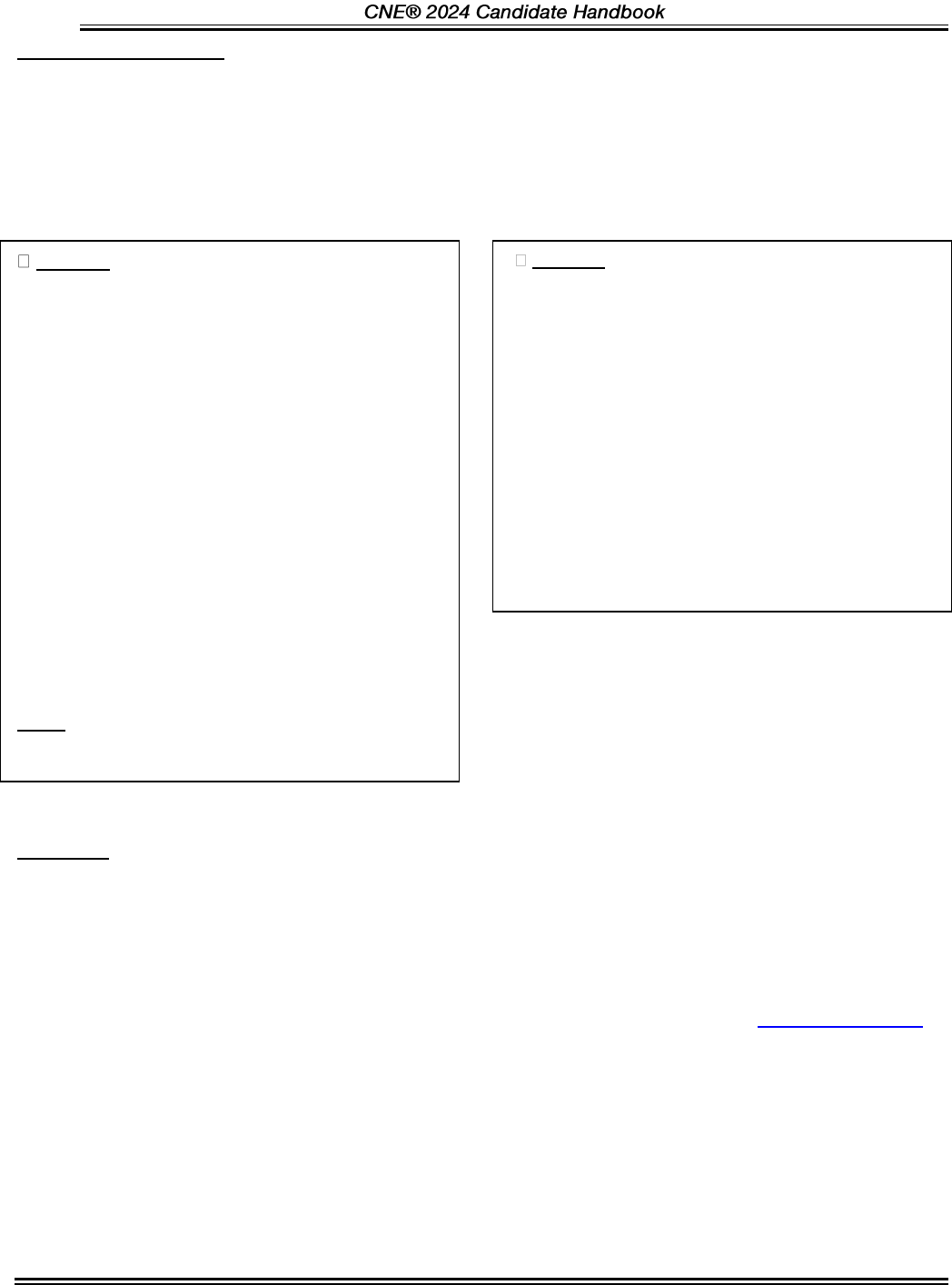
3
Eligibility Requirements
Pursuing certification as an Academic Nurse Educator – designated as CNE -- should be a goal for those who have
carefully reviewed the test blueprint and the eligibility requirements and determine that their educational and
experiential qualifications have provided sufficient opportunity to participate meaningfully in the full scope of the
faculty role.
All eligibility criteria for initial certification must be met at the time of application.
Option A: Must meet criteria 1 & 2
1. Licensure: Documentation of valid licensure/
certificate or other documentation of unencumbered
practice in the country of residence.
2. Education: A master’s or doctoral degree in nursing
with:
• a major emphasis in nursing education
or
• post-master’s certificate in nursing education
or
• nine or more credit hours of graduate-level
education courses*
Examples of acceptable graduate-level education
courses include: Curriculum Development and
Evaluation; Instructional Design; Principles of
Adult Learning; Assessment/Measurement &
Evaluation; Principles of Teaching and Learning;
Instructional Technology.
NOTE: Graduate-level research or statistics courses do
not count toward this requirement.
Option B: Must meet criteria 1, 2 & 3
1. Licensure: Documentation of valid licensure/
certificate or other documentation of unencumbered
practice in the country of residence.
2. Education: A master’s or doctoral degree in nursing
(with a major emphasis in a role other than nursing
education).
3. Experience: Two years or more employment in a
nursing program in an academic institution within the
last five years.
Disclaimer
The Certified Nurse Educator exam was developed to measure competence in the full scope of the academic nurse
educator practice role. Even though the CNE® eligibility criteria have been expanded to include new graduates of
master’s and doctoral programs focused in nursing education, the test itself was not developed as a measure of
graduate program outcomes.
Any individual who wishes to appeal the determination of compliance with CNE® eligibility requirements must
submit a written request with supporting documentation. For more information, please email [email protected] or
call (618) 534-0294.
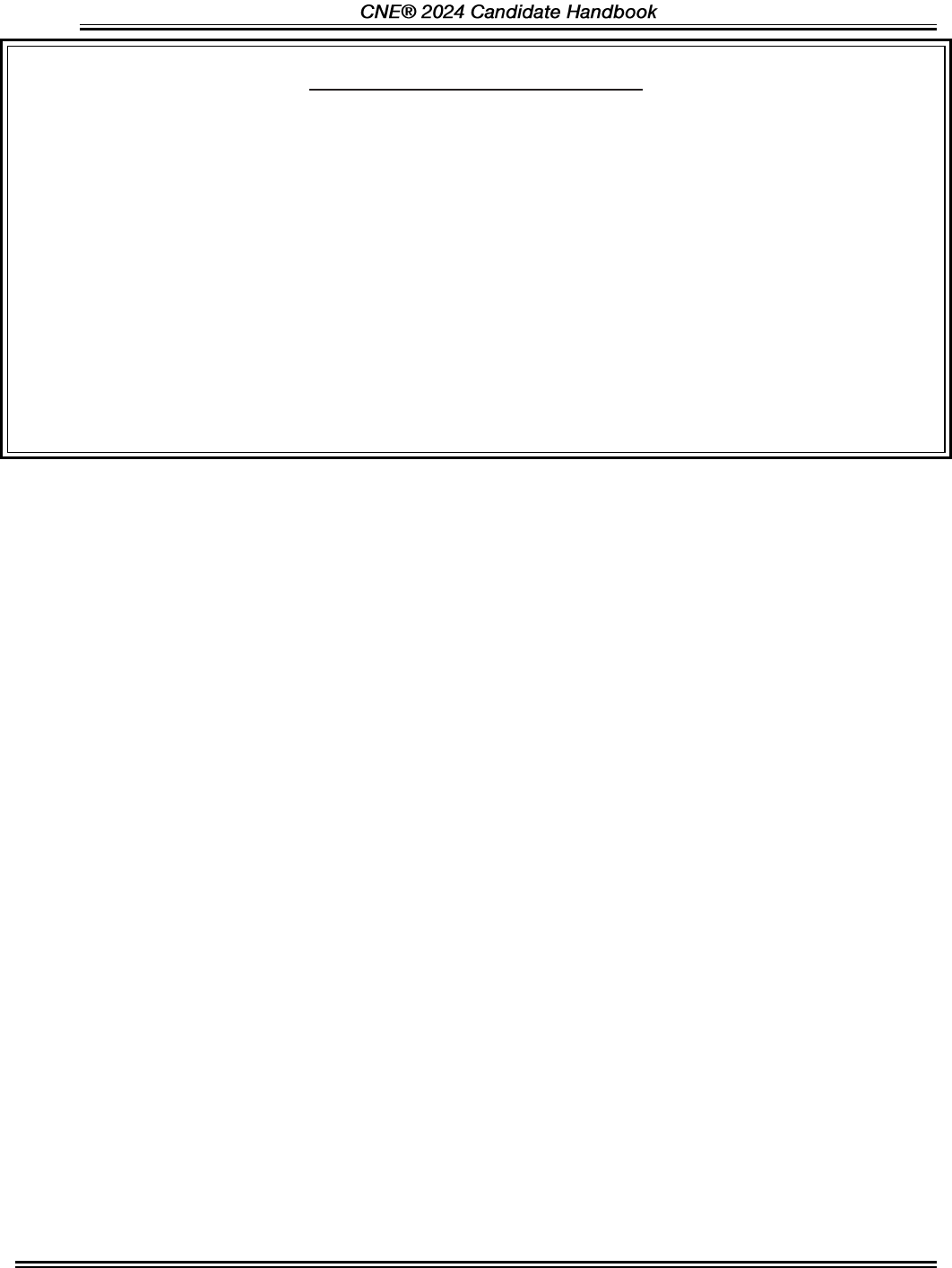
4
STATEMENT OF NONDISCRIMINATION
This certifying organization does not discriminate among candidates as to age, sex, race, religion, national origin,
ethnicity, disability, marital status, sexual orientation, gender identity, or military status. Review of test items,
inclusive of the potential of test item bias, is maintained.
Candidates have the right to expect all aspects of the certification process to be fair and free from discrimination.
All reasonable efforts should be made to ensure examinations are job-related; no candidate is excluded from the
examination as a result of age, sex, race, religion, national origin, ethnicity, disability, marital status, sexual
orientation, and gender identity; language that may be offensive to population subgroups has been eliminated; and
bias and stereotyping have been reduced.
Bias is the presence of an item characteristic that results in the differential performance of candidates of equal
ability. Variations in test results are acceptable only when they reflect the true ability of candidates and not when
they result from unintended interpretation of the item by an identifiable subgroup. Bias in an examination is a
validity issue.

5
Certification
The mark, CNE®, is a registered mark owned by the
National League for Nursing. Academic nurse educators
who meet the eligibility criteria and pass the CNE®
examination may use the certification mark “CNE” following
the name (e.g., S. Smith, MSN, RN, CNE). The certification
mark may be used only as long as certification is valid, after
which time certification may be renewed. Certification is valid
for five years; it begins the date the candidate receives an
official passing test score and ends on December 1
st
of the
fifth year following the date of the exam. Certification is a
non-transferable, revocable, limited, non-exclusive
affirmation to use the certification designation “CNE”, subject
to compliance with the policies and procedures, as may be
revised from time to time.
Each successful candidate will have the opportunity to
download and print a certificate from the NLN Certification
Portal. Information on the current certification status of an
individual will be provided in writing upon request. The NLN
reserves the right to publish a listing of certificants (i.e., those
who have passed the examination). NLN owns all rights to
the CNE®
designation.
Recertification/Renewal
CNE® certification status is granted for a period of five
years. The five-year renewal cycle is based on the currency
of practice in nursing and changes associated with
pedagogy (for example, increased focus on simulation).
The purpose of requiring certification renewal is to ensure
the educator has continued to expand knowledge relevant
to the full scope of the academic nurse educator role. Use
of the CNE credential is valid until the date indicated on the
CNE® certificate issued by the NLN’s Academic Nurse
Educator Certification Program. A certified nurse educator
can renew the certification by maintaining practice
requirements and fulfilling professional development
requirements; individuals can also continue their
certification by re-taking the Certified Nurse Educator
(CNE®) examination, provided the then-current eligibility
requirements are met. The Renewal application will be due
by September 30 of the 5
th
year. The Certified Nurse
Educator Renewal Webpage, available online at
www.nln.org/certification/Certification-for-Nurse-
Educators/cne provides additional information about
these processes. *Please note: Beginning with
certifications obtained after January 1, 2021, with renewal
due during 2026 (and beyond), renewals will require 75
Renewal Credits for the five-year cycle.
The renewal of the certification requires evidence of
continuing competency being demonstrated by activities
directly linked to the competencies of the certification.
Continuing competency of renewal activities should show
ongoing demonstration of levels of knowledge and skills
being applied to the role of the nurse educator, and a
commitment to professional development and growth that
is represented with the credential.
To ensure the integrity of the CNE® certification renewal
process, randomly selected renewal applications will be
audited each year. Certificants who are selected for audit will
be notified and required to provide supporting
documentation. It is advisable to keep documentation of
certification renewal activities in the event that one is
selected for renewal audit. Certificants who are audited and
not able to provide the necessary supporting documentation
will have their CNE credential revoked.
Individuals who choose to renew by examination and do
not achieve a passing score, as well as those who elect
not to renew their certification, are prohibited from using the
CNE designation.
Certificants who have retired from academic responsibilities
but wish to continue their CNE® credential should complete
the application for the “Retired Status.” The application for
“Retired Status” will be available in the Menu options for
the candidate on the Certification Portal.
It is the certificant’s professional responsibility to adhere to
renewal or recertification dates, provide required
documentation, and keep abreast of changing certification
requirements. It is also the certificant’s responsibility to keep
the NLN Academic Nurse Educator Certification Program
informed of any changes in email address, mailing address,
or other pertinent contact information.
About the CNE® Examination
The CNE® examination is designed to evaluate the
candidate’s knowledge about the full-scope of the academic
nurse educator role. The examination consists of 150
multiple-choice items, 130 of which count toward the scoring
of the exam. The remaining 20 items are newly-developed
ones that are being pretested and, therefore, do not count
toward the scoring of the exam. Candidates will not know
which items are scored and which are pretest items. The
purpose of pretesting is to determine if items are statistically
sound and fair. Extensive statistical analyses are performed
on each newly-developed item to determine how well it
performs. Items that have poor statistics are not used on
future examinations. Items that perform well when pretested
are used on future test forms as items that count toward
scoring.
The examination is developed through a collaborative effort
between the NLN and Meazure Learning. Academic nurse
educator experts, drawn from a wide variety of program
types and geographical areas, write examination items that
reflect the role competencies, examination content outline
and examination specifications, as developed by the NLN
(Halstead, 2019). The NLN also approves the individual
examination for administration, sets the passing score for
successful achievement, and determines individual eligibility
for taking the examination based on published criteria.
Meazure Learning is responsible for the computerized
testing sites, examination security, examination
administration, scoring and statistical analysis, and
maintaining an item bank of approved examination
questions.
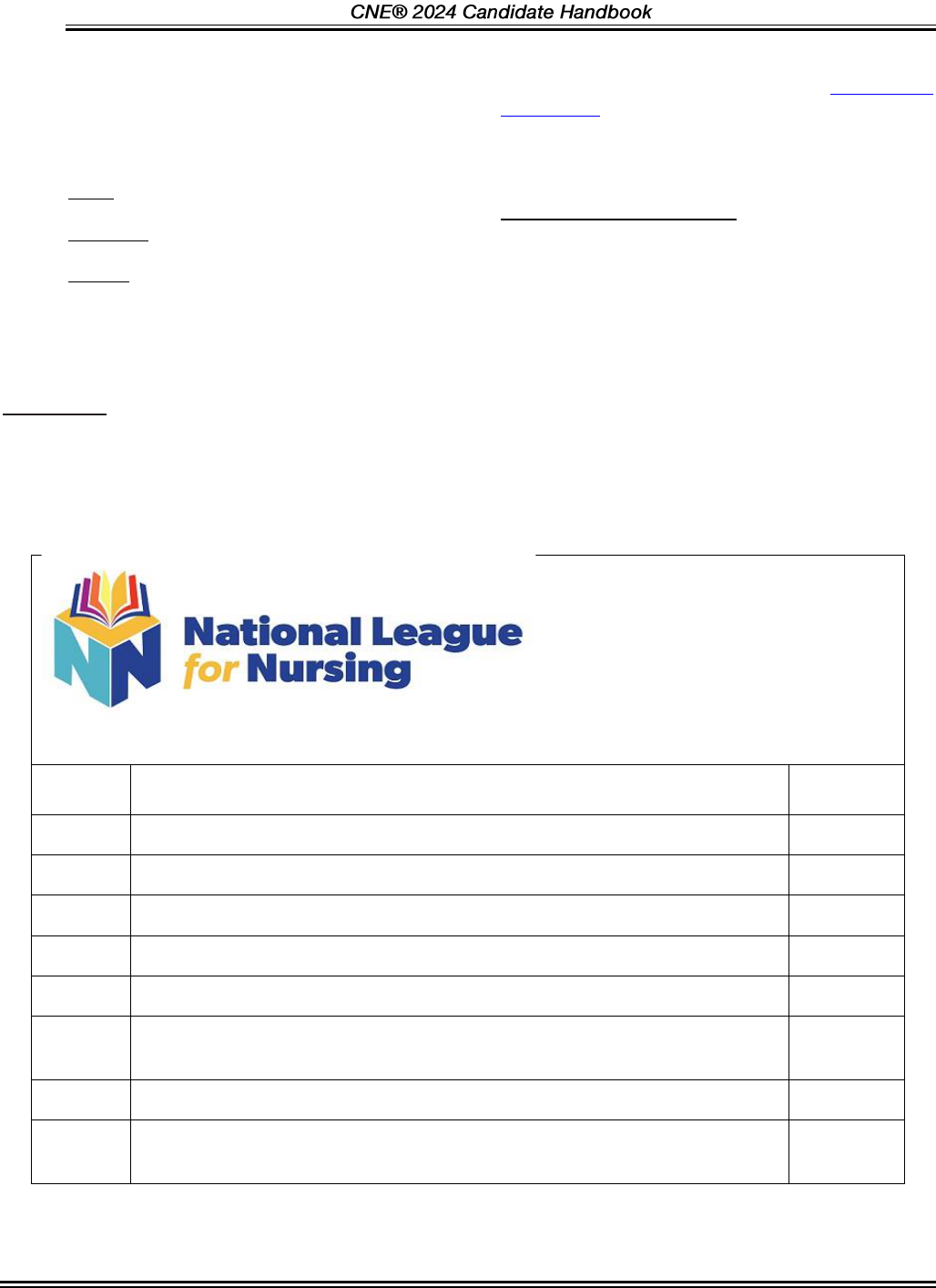
6
The Test Development Committee and members of
Meazure Learning assemble various forms of the test from
the approved questions. The examination consists of three-
option, multiple-choice questions that reflect different
cognitive levels:
1. Recall: The ability to recall or recognize specific
information.
2. Application: The ability to comprehend, relate or
apply knowledge to new or changing situations.
3. Analysis: The ability to analyze and synthesize
information, determine solutions and/or evaluate
the usefulness of a solution.
The emphasis is on application and analysis questions.
Test Format
Computer-based testing (CBT) –
The CNE® examination is available via computer-based
testing. The exam is offered Monday through Saturday at
Meazure Learning Assessment Centers throughout the
United States. Specific information about Meazure Learning
assessment centers can be found at www.Meazure
Learning.com. Live on-line proctored test administration is
also available. Requirements and specifications are
addressed later in this handbook.
Examination Test Blueprint
The content of the Certified Nurse Educator (CNE®)
examination is based on the CNE® test blueprint which was
developed from the Academic Nurse Educator Practice
Analysis completed in 2023. To ensure the content is
current, practice-related, and representative of the
responsibilities of academic nurse educators in the United
States, the practice analysis is updated periodically.
The test blueprint is presented here in its entirety. It is
composed of eight major content areas, each with assigned
percentages and numbers of items. Each major content
area is represented in every examination with the
appropriate percentage of items. However, not all content
sub-areas are included on every form of the test.
Certified Nurse Educator (CNE®) Examination
Test Blueprint
Category
Major Content Areas
Item Count
1
Facilitate Learning
47
2
Facilitate Learner Development and Socialization
18
3
Use Assessment and Evaluation Strategies
18
4
Participate in Curriculum Design and Evaluation of Program Outcomes
13
5
Function as a Change Agent and Leader
9
6
Pursue Continuous Quality Improvement in the Academic Nurse Educator Role
9
7
Engage in Scholarship
7
8
Function within the Organizational Environment and the Academic Community
9
© 2023. NLN. All rights reserved
Note: Each examination form contains 150 items including 20 unscored items being pretested for future use.
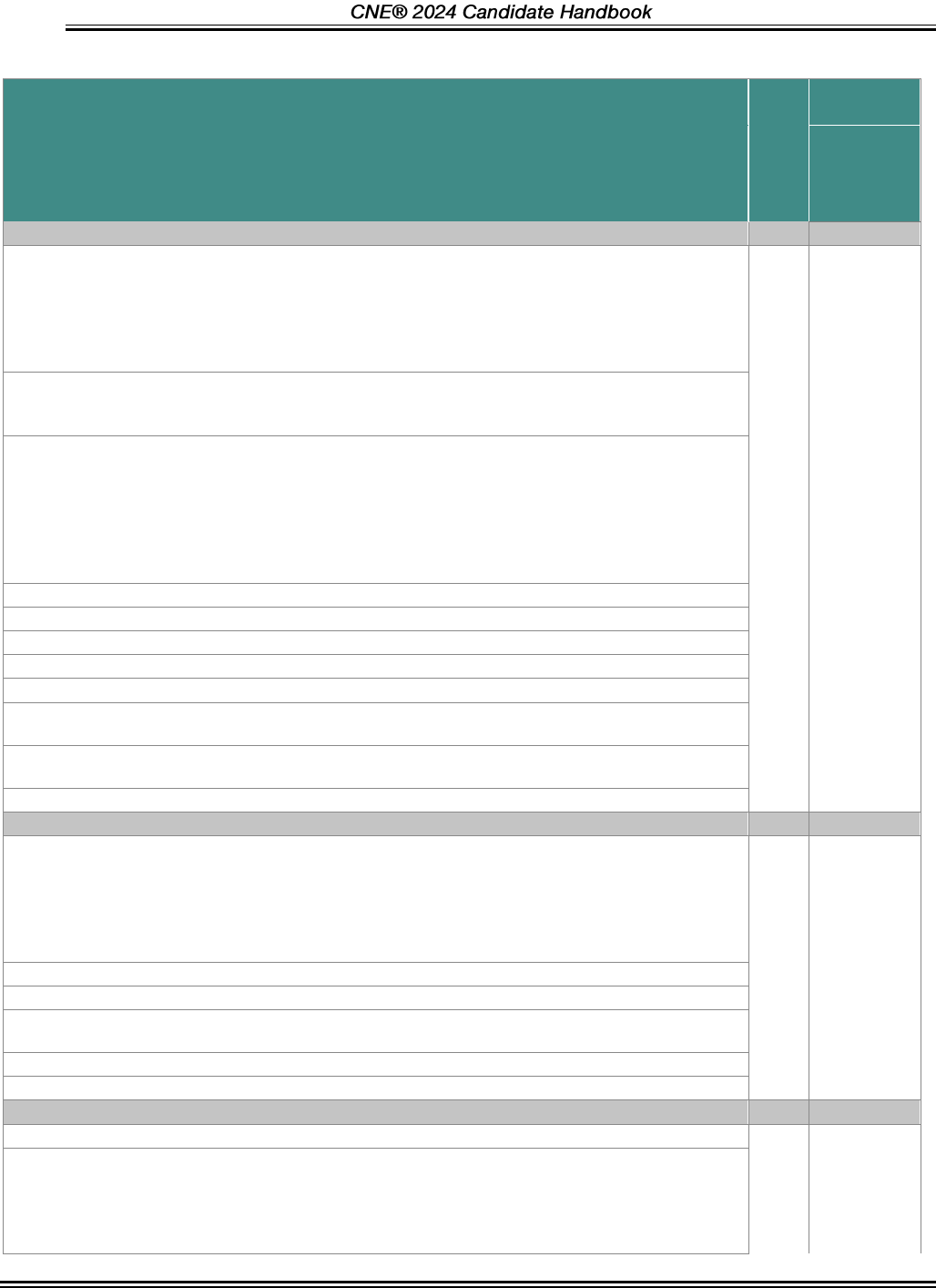
7
NLN CNE 2023 Detailed Test Blueprint
Class
Code
Cognitive
Level
Description
Item
Count
Recall
Application
Analysis
010000
Domain 1: Facilitate Learning
47
7
26
14
010100
A. Implement a variety of active teaching and learning strategies appropriate to:
1. content/concepts
2. setting
3. learner attributes and needs
4. learner outcomes
5. method of delivery
010200
B. Use teaching and learning strategies based on:
1. educational theories
2. evidence-based practices related to education
010300
C. Modify teaching strategies and learning experiences based on consideration of
learners’:
1. diversity
2. social determinants of learning (i.e., physical health, psychosocial health,
economic stability, physical environment, social environment, and self-
motivation)
3. past clinical, educational, and life experiences
010400
D. Use technologies to support the teaching-learning process
010500
E. Communicate effectively to convey ideas in a variety of contexts
010600
F. Model reflective thinking practices
010700
G. Create opportunities for learners to develop clinical judgment
010800
H. Ensure a positive and safe learning environment
010900
I. Model attributes that facilitate learning (e.g., caring, confidence, patience,
integrity, respect, flexibility, resilience, enthusiasm)
011000
J. Develop and maintain effective working relationships with healthcare and
education partners
011100
K. Apply concepts of evidence-based practice in nursing to guide teaching
020000
Domain 2: Facilitate Learner Development and Socialization
18
3
10
5
020100
A. Identify learner attributes and needs based on consideration of learners':
1. diversity
2. social determinants of learning (i.e., physical health, psychosocial health,
economic stability, physical environment, social environment, and self-
motivation)
3. past clinical, educational, and life experiences
020200
B. Facilitate access to various resources to support diverse learners
020300
C. Assist learners to identify and develop a plan to meet professional goals
020400
D. Facilitate learners’ self-reflection, goal setting, and socialization to the role of
the nurse
020500
E. Engage learners in thoughtful and constructive self and peer evaluation
020600
F. Promote professional development of learners
030000
Domain 3: Use Assessment and Evaluation Strategies
18
2
10
6
030100
A. Design and apply formative and summative evaluation strategies
030200
B. Implement evidence-based assessment and evaluation strategies in these
learning domains:
1. cognitive
2. psychomotor
3. affective
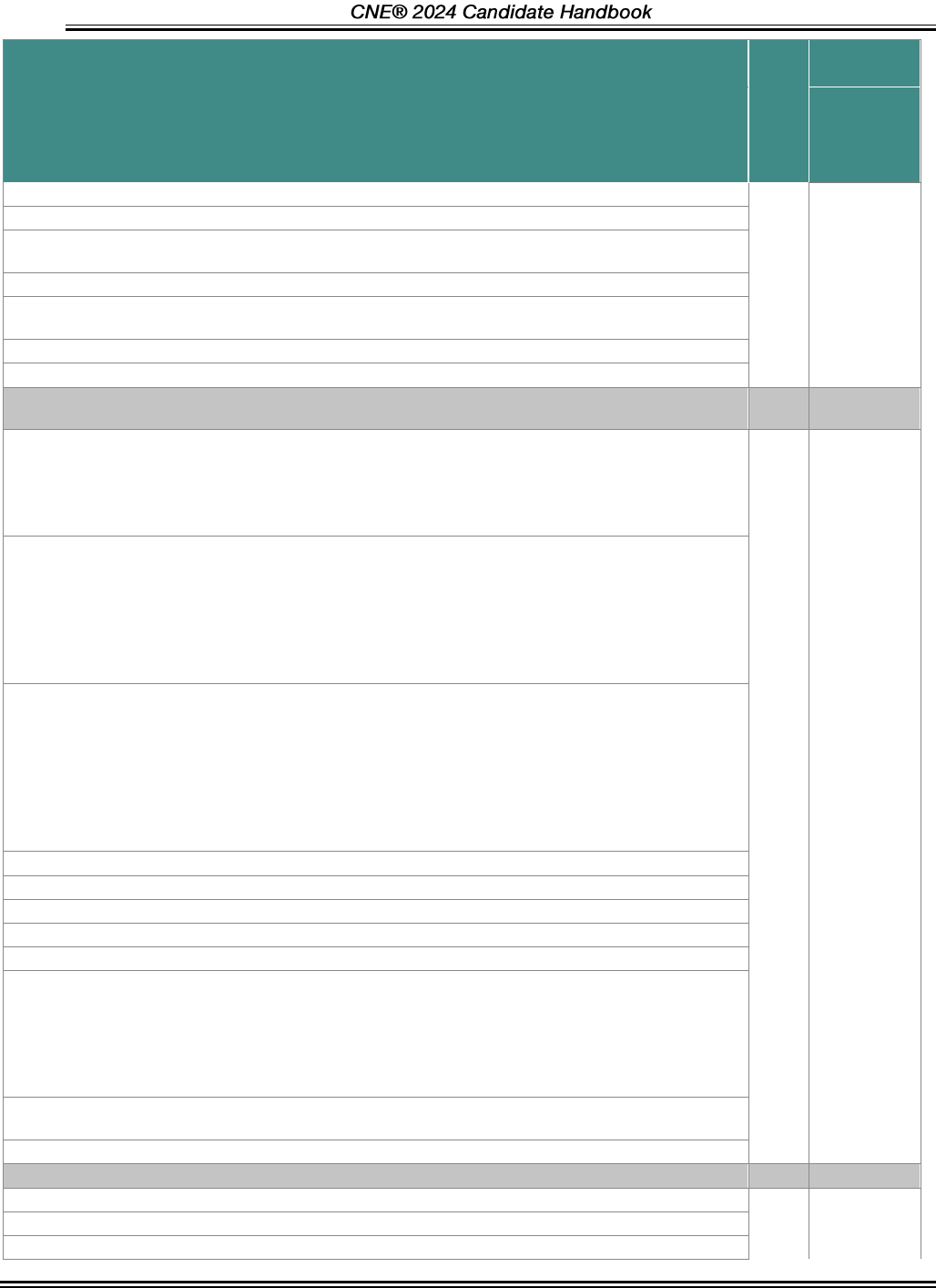
8
Class
Code
Cognitive
Level
Description
Item
Count
Recall
Application
Analysis
030300
C. Evaluate available methods for learner assessment and evaluation
030400
D. Create assessment methods to evaluate outcomes
030500
E. Implement evaluation methods that are congruent with learner and learning
outcomes
030600
F. Analyze assessment and evaluation data
030700
G. Apply assessment and evaluation data to enhance the teaching-learning
process
030800
H. Inform learners about assessment and evaluation criteria
030900
I. Provide timely, constructive, and thoughtful feedback to learners
040000
Domain 4: Participate in Curriculum Design and Evaluation of Program
Outcomes
13
1
8
4
040100
A. Provide input for the development of nursing program standards and policies
regarding:
1. admission
2. progression and retention
3. graduation
040200
B. Demonstrate knowledge of curriculum development including:
1. developing program outcomes and/or competency statements
2. writing content objectives and course outcomes
3. selecting learning activities and clinical experiences consistent with
course outcomes
4. designing evaluation strategies consistent with course and program
outcomes
040300
C. Design the curriculum to reflect:
1. institutional philosophy and mission
2. current nursing and healthcare trends
3. community, clinical partners, and societal needs
4. nursing principles, standards, theory, and research
5. educational principles, theory, research, and innovation
6. use of technology
7. mode of educational delivery
040400
D. Lead the development of curriculum design
040500
E. Lead the development of course design
040600
F. Design program evaluation that promotes continuous quality improvement
040700
G. Implement the program evaluation plan
040800
H. Analyze results of program evaluation
040900
I. Revise the curriculum based on evaluation of:
1. program outcomes
2. learner needs
3. societal and health care trends
4. stakeholder feedback (e.g., learners, agency personnel, accrediting
agencies, advisory boards, community and clinical partners)
041000
J. Implement curricular revisions using change theories and evidence-based
strategies
041100
K. Evaluate the program evaluation plan
050000
Domain 5: Function as a Change Agent and Leader
9
2
5
2
050100
A. Evaluate organizational effectiveness to determine needed change
050200
B. Adapt to changes created by external factors
050300
C. Create a culture for change within the nursing program and institution
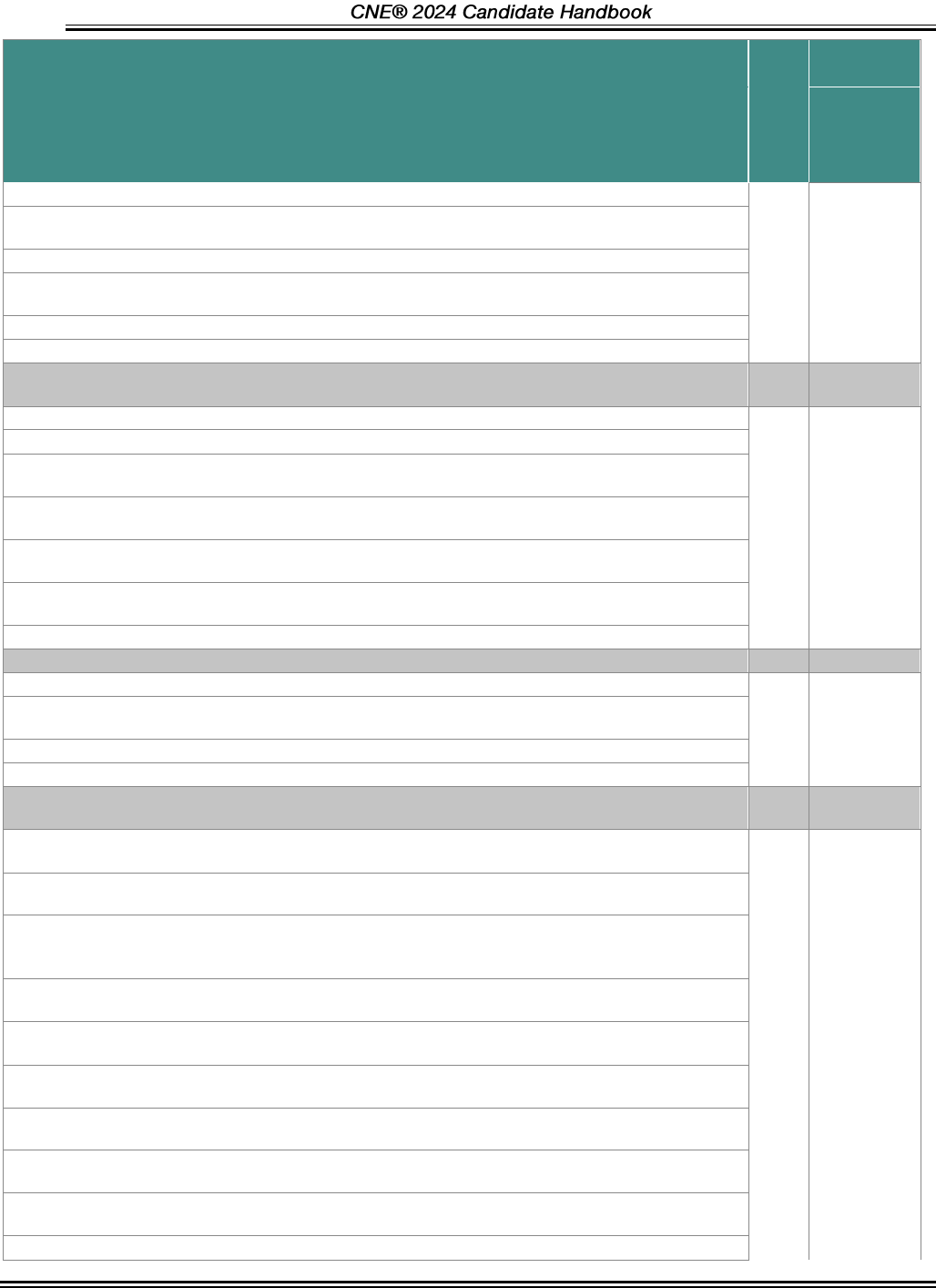
9
Class
Code
Cognitive
Level
Description
Item
Count
Recall
Application
Analysis
050400
D. Design, implement, and evaluate strategies for change
050500
E. Model principles of diversity, equity, and inclusivity when advocating for
change
050600
F. Serve as a leader to promote nursing and nursing education
050700
G. Facilitate interprofessional education and collaboration to impact health and
educational outcomes
050800
H. Advocate for nursing, nursing education, and higher education
050900
I. Manage conflict effectively
060000
Domain 6: Pursue Continuous Quality Improvement in the Academic Nurse
Educator Role
9
1
6
2
060100
A. Participate actively in professional nursing and educational organizations
060200
B. Demonstrate a commitment to lifelong learning
060300
C. Use feedback gained from self, peer, learner, and administrative evaluation to
improve role effectiveness
060400
D. Stay current with legal practices and ethical codes relevant to nursing and
educational settings
060500
E. Remain informed with healthcare policy relevant to nursing and educational
settings
060600
F. Seek mentors for professional development in the academic nurse educator
role
060700
G. Engage in self-reflection and self-care to improve teaching practices
070000
Domain 7: Engage in Scholarship
7
2
5
0
070100
A. Foster a culture of scholarly inquiry
070200
B. Demonstrate qualities of a scholar: integrity, courage, perseverance, vitality,
and creativity
070300
C. Design and implement scholarly activities
070400
D. Disseminate the outcomes of scholarly activities
080000
Domain 8: Function within the Organizational Environment and the
Academic Community
9
1
6
2
080100
A. Analyze the impact of social, technological, economic, political, and
institutional factors on nursing and higher education
080200
B. Apply knowledge of historical and current trends and issues to decision
making in nursing and higher education
080300
C. Integrate the values of civility, collegiality, professionalism, and caring to build
an organizational climate that fosters the development of learners and
colleagues
080400
D. Demonstrate support of diversity, equity, and inclusion initiatives to align with
the organization’s mission and vision
080500
E. Incorporate the mission and goals of the nursing program and the parent
institution when managing issues
080600
F. Manage the teaching, scholarship, and service demands congruent with the
requirements of the institutional setting
080700
G. Serve as a leader in governance and activities within the nursing program
and/or the parent institution
080800
H. Use social media in a manner consistent with professional and institutional
guidelines
080900
I. Provide input into the budgetary processes of the program and parent
institution
081000
J. Maintain professional role boundaries as an educator
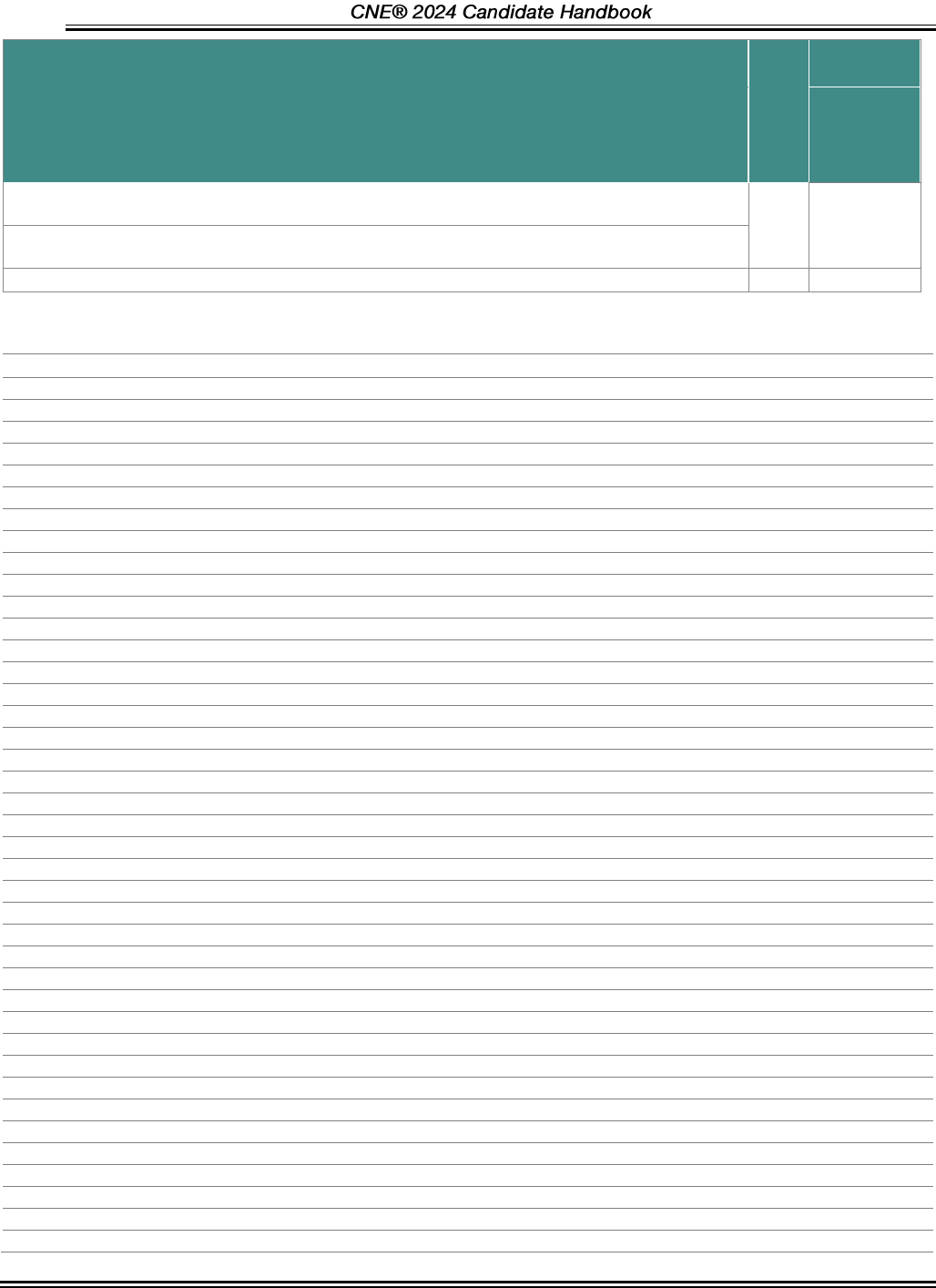
10
Class
Code
Cognitive
Level
Description
Item
Count
Recall
Application
Analysis
081100
K. Seek opportunities to mentor and support faculty colleagues to optimize role of
an academic nurse educator
081200
L. Participate in the development of policies and procedures related to learners,
faculty, and the educational environment
Total
130
19
76
35
NLN CNE 2023NLN CNE Knowledge Statements
1. Academic, professional, and community service opportunities
2. Accreditation, regulatory standards, and policies
3. Advisement and counseling strategies
4. Change management strategies
5. Characteristics and functions of various healthcare teams
6. Characteristics of a safe and inclusive learning environment
7. Characteristics of change agents
8. Communication methods specific to audience and situation
9. Community and societal needs
10. Conflict resolution methods
11. Constructive feedback techniques
12. Critical and reflective thinking strategies
13. Dissemination of information
14. Educational principles, theory, and research
15. Educational resources for supporting diverse learners
16. Evidence-based teaching strategies specific to learner needs and outcomes
17. Formative and summative learner evaluations
18. Goal setting
19. How to be an advocate
20. Identification of personal attributes as a tool to facilitate learning
21. Institutional philosophy and mission
22. Integration of data into practice (i.e., clinical, educational)
23. Interpretation of research literature
24. Interprofessional education competencies
25. Leadership behaviors in nursing education
26. Learning and socialization needs of diverse learners
27. Legal and ethical issues in healthcare and higher education
28. Measures of organizational effectiveness
29. Mentoring principles and methods
30. Methods to assess and evaluate learning
31. Methods to assess learner needs
32. Methods to collaborate with interprofessional teams
33. Methods to create collegial working relationships
34. Methods to develop clinical judgment in the learner
35. Methods to evaluate the learning environment
36. Nursing and health care trends
37. Organizational structure and governance
38. Principles and methods of continuous quality improvement
39. Principles and methods of curriculum design and revision
40. Principles and methods of program evaluation
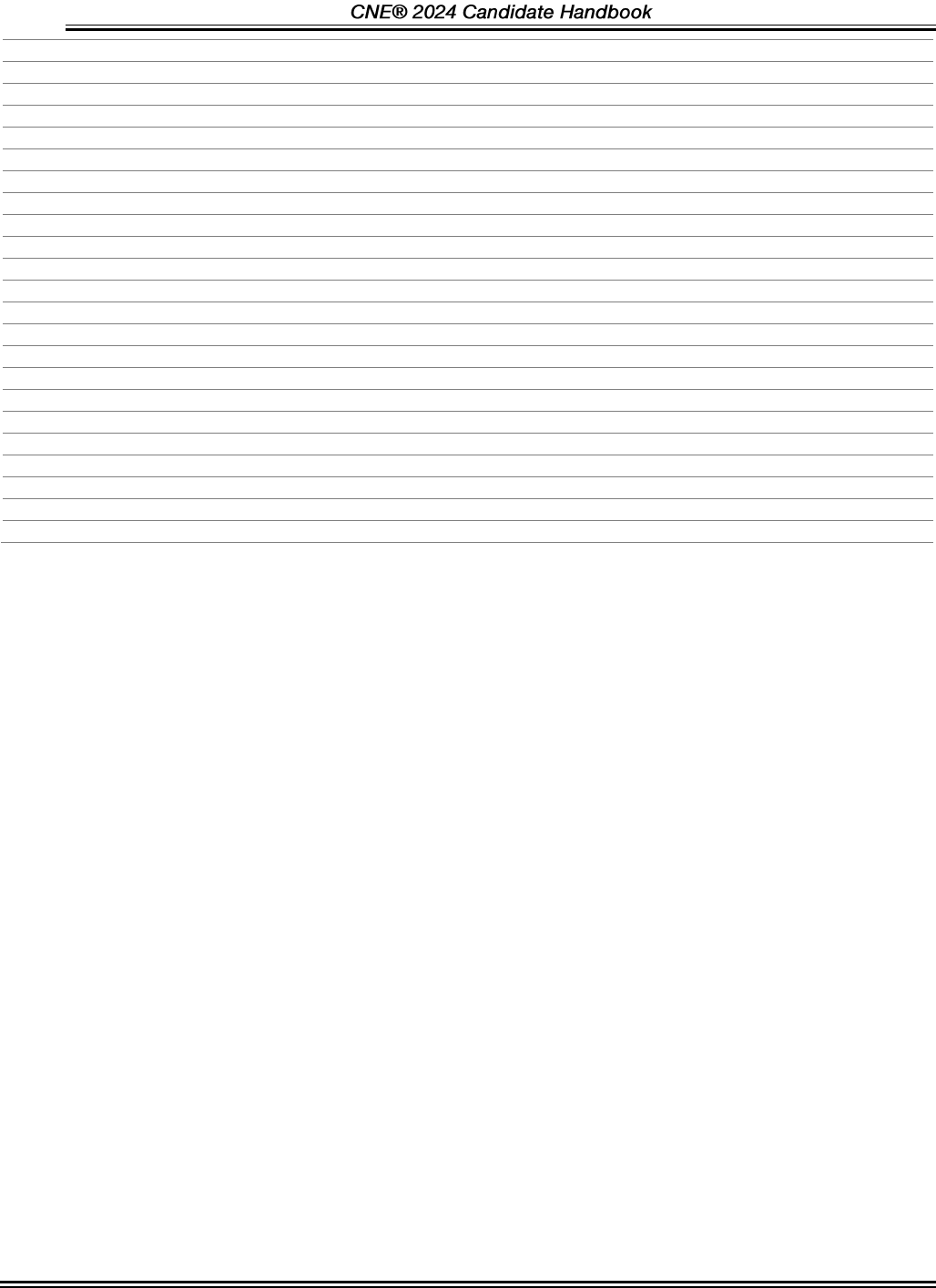
11
41. Principles of diversity, equity, inclusion, and belonging
42. Principles of ongoing professional learning
43. Professional development activities
44. Professional organizations that support ongoing professional learning
45. Professional roles and boundaries
46. Qualities of a scholar
47. Quality improvement and evidence-based practice methodologies
48. Research methodology
49. Role modeling
50. Role of professional nurse and nurse educator
51. Self-care techniques
52. Self-evaluation and reflection techniques
53. Social determinants of learning
54. Socialization process
55. Spirit of inquiry
56. Strategies to promote a culture of safety and quality
57. Student success strategies
58. Teaching, scholarship, and service demands
59. Technologies and equipment to facilitate learning
60. Technology trends in healthcare and higher education
61. Test and item analysis
62. Test development
63. Variations of educational settings and delivery methods
© 2023. NLN. All rights reserved.
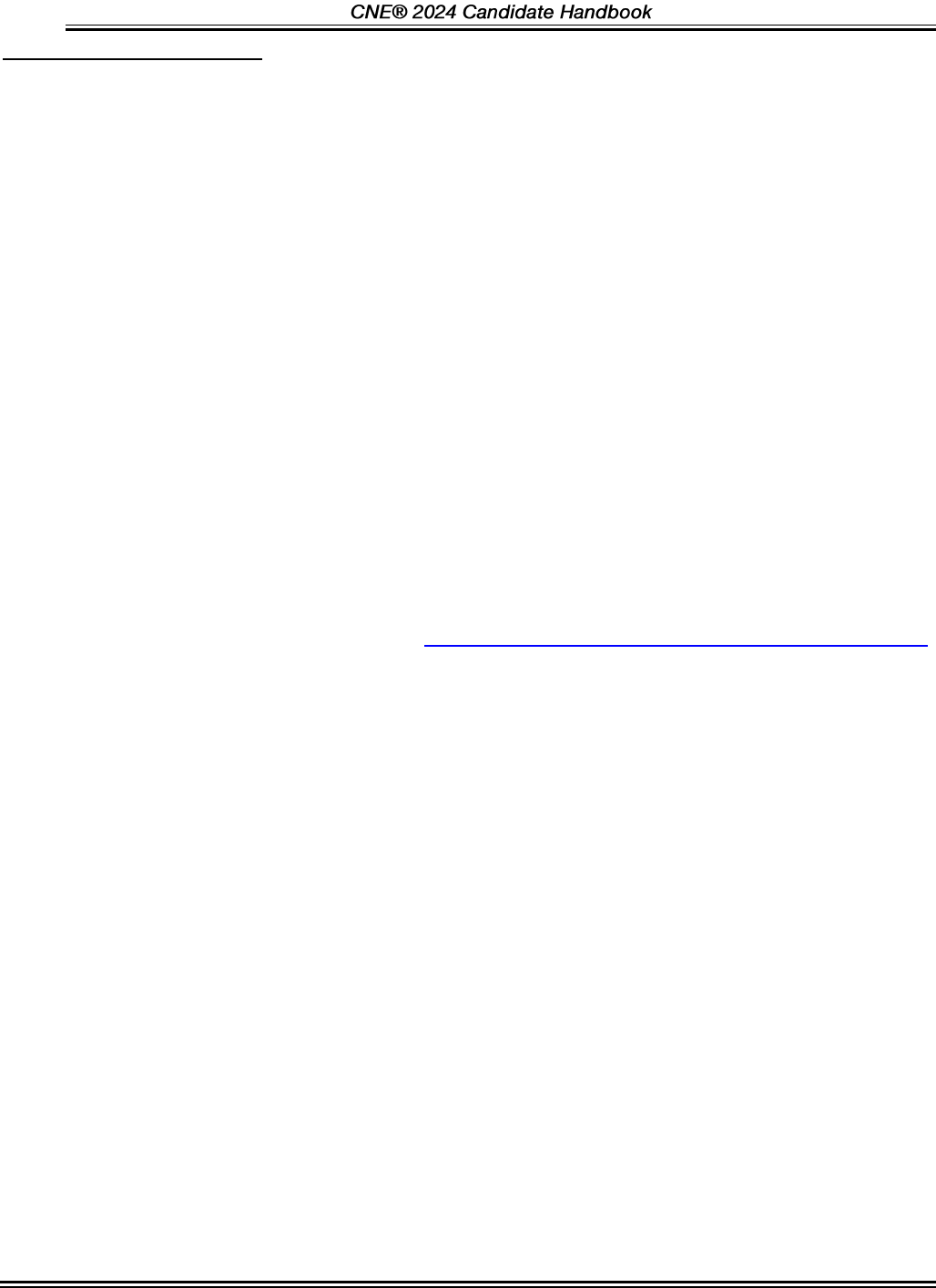
12
Preparing for the Examination
Before preparing for the Certified Nurse Educator examination, it is important to confirm that all eligibility requirements
are met. The Certified Nurse Educator examination is designed to assess the knowledge one has acquired as a
result of one’s academic preparation, continued learning, and engagement in the full scope of the faculty role. To
that end, it is recommended that in preparing for this examination, the detailed test blueprint is reviewed carefully to
identify the content areas that are included in the exam and determine which areas call for focused study. Take note
of how each content area is weighted to determine the percentage of questions that pertain to each area and make
full use of the reference list that is provided. This list is provided to serve as a guide and is not intended to be all-
inclusive. It also is recommended that one examine the sample questions that are included on pages 15-16 of this
Handbook as they are similar to the ones found on the examination; the sample questions do not, however, represent
the full range of content or levels of difficulty.
To assist in preparing for the CNE exam, it would also be helpful to read through the Certified Nurse Educator Review
Book (Caputi, 2019). This book devotes a full chapter to each of the 8 core competencies for nurse educator. Each
chapter provides information about the competency and each of its task statements, includes practice test questions,
and offers references that are specific to that competency.
Finally, a Self-Assessment Examination (SAE) is available to help prepare candidates for success in obtaining the
Certified Nurse Educator (CNE®) credential. The NLN offers this internet-based, 65-item, multiple-choice practice
exam with the assistance of our testing partner, Meazure Learning. The SAE can be considered a learning tool and
assessment instrument that is parallel in form to the actual CNE® examination. The CNE® SAE is a half-length
examination that meets the examination specifications including content outline coverage, percentage of items in
each of the content categories, and cognitive complexity item distribution. By taking the SAE, candidates are able
to practice taking CNE®-type questions, experience computer-based testing, review rationales for correct and
incorrect answers, and receive a score report to assess strengths and areas for additional study. Please be aware
that the CNE® SAE is not intended to replace studying for the CNE® examination, and it should not be inferred
that performance on this practice examination will exactly replicate performance on the credentialing examination.
For information about ordering the SAE, please visit www.nln.org/certification/Certification-for-Nurse-Educators/cne
and select CNE Exam Prep from the sidebar.
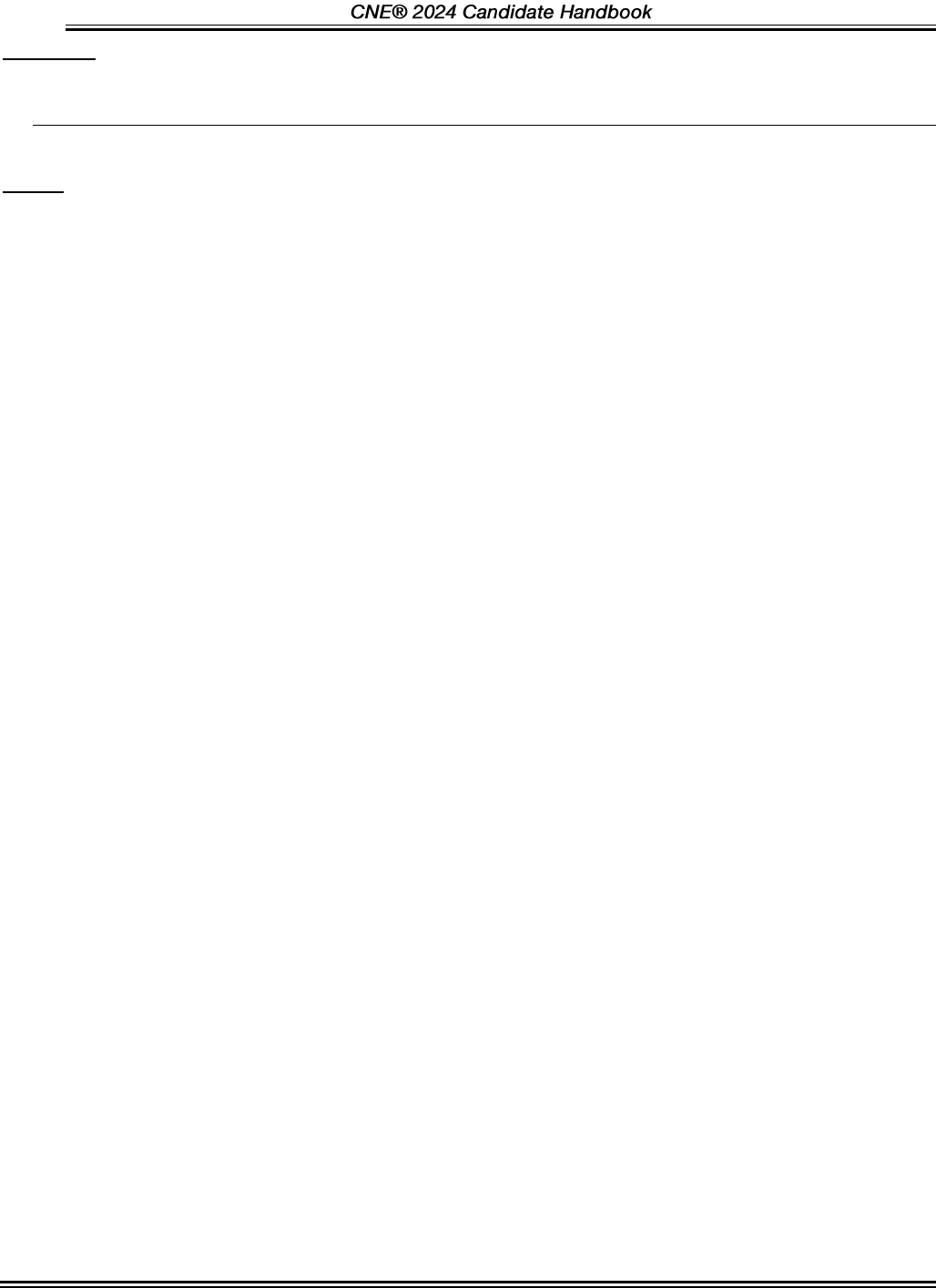
13
Resources
Certified Nurse Educator (CNE®) Examination
Books
Bastable, S. (2014). Nurse as educator: Principles of teaching and learning for nursing practice (4
th
ed.).
Burlington, MA: Jones and Bartlett Learning.
Billings, D. M. & Halstead, J. (Eds). (2016). Teaching in nursing (5
th
ed.). St. Louis, MO: Elsevier
Saunders.
Gaberson, B., Oermann, M. & Shellenbarger, T. (2015). Clinical teaching strategies. New York, NY:
Springer Publishing Company.
Halstead, J.A. (Ed.). (2019). NLN core competencies for nurse educators: A decade of influence.
Washington, DC: National League for Nursing.
Oermann, M., DeGagne, J.C. & Phillips, B.C. (2018). Teaching in nursing and role of the educator (2
nd
ed). New York, NY: Springer Publishing Company.
Oermann, M. H. & Gaberson, K.B. (2018). Evaluation and testing in nursing education (5
th
ed.). New
York, NY: Springer Publishing Company.
Oermann, M.H., Shellenbarger, T. & Gaberson, K.B. (2018). Clinical teaching strategies in nursing. New
York, NY: Springer Publishing Company.
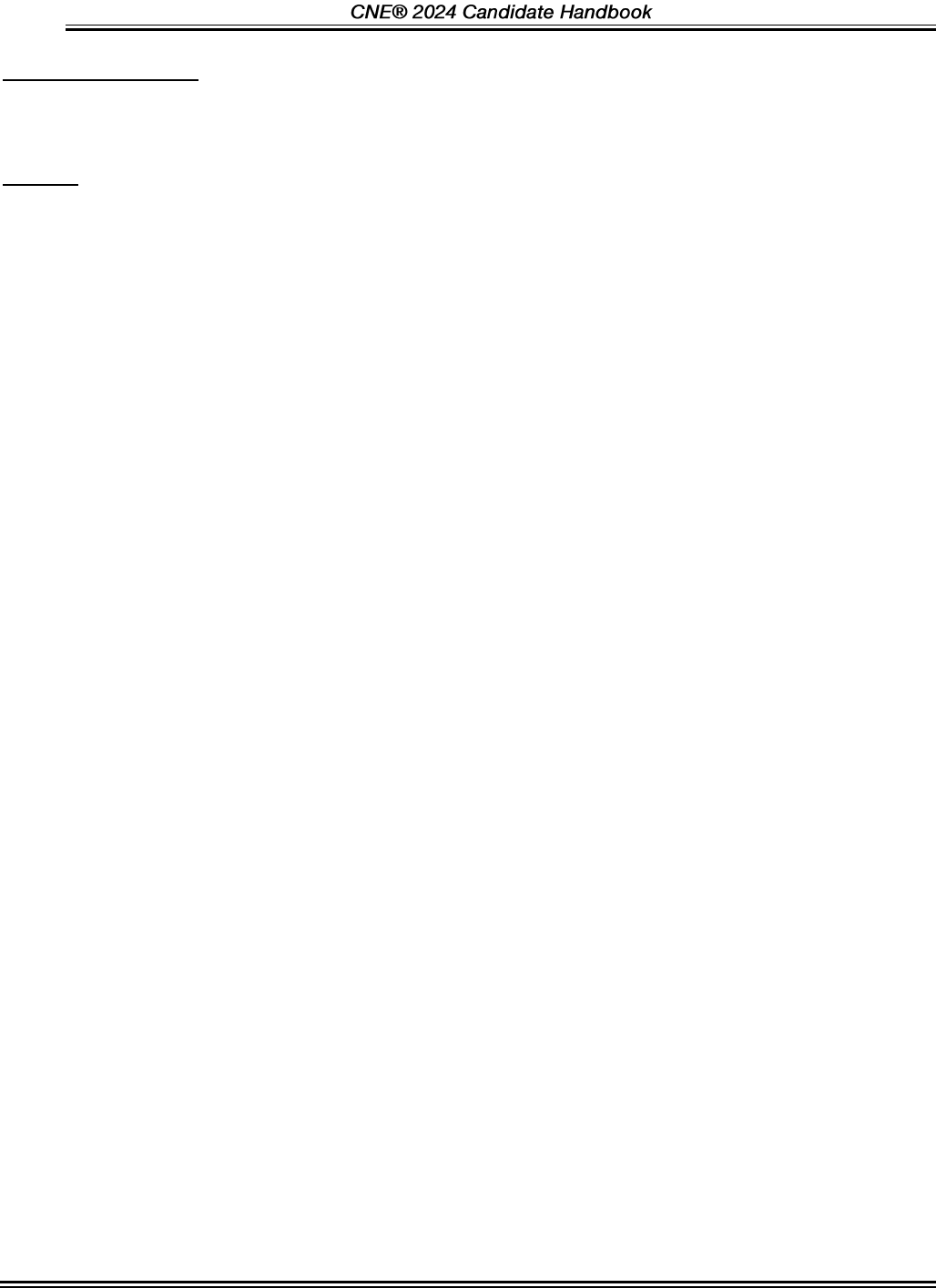
14
Resources, continued:
Certified Nurse Educator (CNE®) Examination
Journals
Assessment and Evaluation in Higher Education
EduCause Review
Higher Education Research and Development
International Journal of Nursing Education Scholarship
Journal of Continuing Education in Nursing
Journal of Nursing Education
Journal of Professional Nursing
Nursing Education in Practice
Nursing Education Today
Nursing Education Perspectives
Nursing Educator
Quality in Higher Education
Teachers and Teaching: Theory and Practice
Teaching in Higher Education
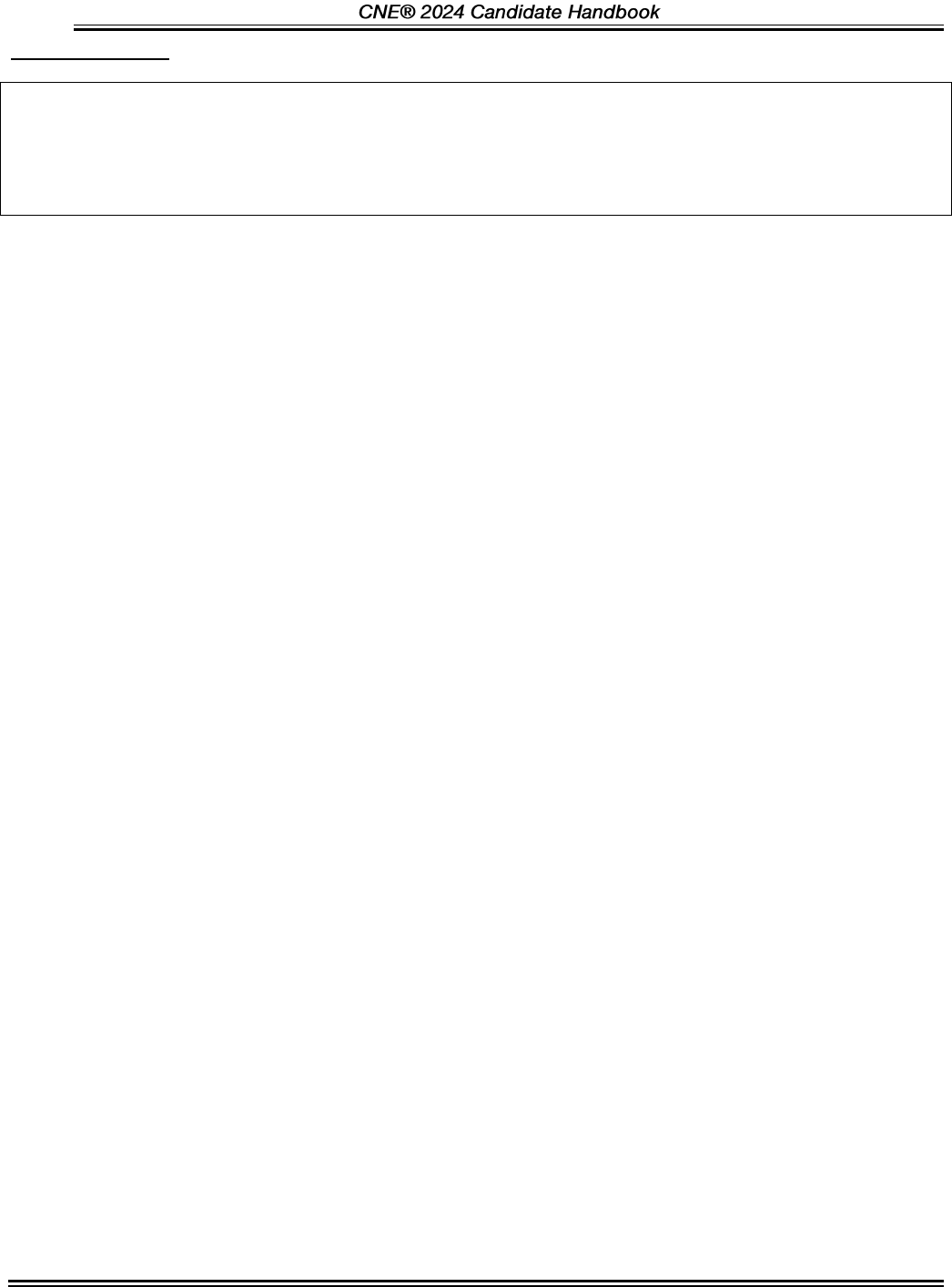
15
Sample Questions
The following sample items are representative of the item format used in the CNE® examination.
These items do not represent all content areas or difficulty levels.
An answer key is located at the end of this section.
1. Which learning activity would provide the learner
with the highest level of cognitive learning?
a. Attending a lecture
b. Writing a summary
c. Participating in a case study
d. Reviewing content using presentation
software
Test Blueprint: 1 B 1
Cognitive Code: Application
2. A learner approaches a nurse educator to discuss
a grade earned on a written assignment. The
learner is upset because the grade is lower than a
peer’s grade. Which is the best response?
a. “The paper was graded using the rubric
provided in the syllabus, however we can
discuss some areas in which your paper could
be improved.”
b. “I will review your paper one more time by
comparing it to your peer’s papers.”
c. “If there is an area in your paper that you think
needs reevaluation, please provide
documentation to support your concern and I
will issue you extra credit points.”
d. “Before I can compare your paper to your
peer’s, I need permission from your peer.”
Test Blueprint: 2 D
Cognitive Code: Application
3. A nurse educator is reviewing the item-analysis of
a multiple-choice question. An item on the
examination performed in this manner:
Option A B C D E
N 2 2 113 23 194
Pt Biserial +0.06 -0.16 -0.07 -0.02 +0.09
P value = 0.34 Correct answer = C N = 334
Which is the likely cause for this frequency
distribution?
a. The use of five options widens the distribution
b. Distracters are too easy to eliminate
c. Average-ability learners have previously seen
this item
d. Learners who scored highest on the exam got
the item incorrect
Test Blueprint: 3 F
Cognitive Code: Analysis
4. A nurse educator is reviewing program evaluation
data. A benchmark indicating that 85% of learners
will pass the NCLEX® exam on the first attempt
has not been met for the past two years. Which
would be a priority recommendation for the nurse
educator to make?
a. Lower the NCLEX® pass rate benchmark to
80%
b. Implement an exit exam prior to graduation
c. Evaluate the nursing program’s curriculum
d. Increase the passing grade for each nursing
course to 85%
Test Blueprint: 4 H
Cognitive Code: Analysis
5. A novice nurse educator has just completed the
first year of teaching and is meeting with a mentor
to plan professional development activities for the
next academic year. Which statement by the
novice nurse educator would require follow up by
the mentor?
a. "I am interested in co-teaching a class with a
pharmacist from a local hospital."
b. "I want to learn how to incorporate some web-
based assignments for learners next
semester."
c. "I need to learn more about how to write
multiple-choice test questions that assess
critical thinking."
d. "I plan to run for president of the college
senate in the fall."
Test Blueprint: 5 F
Cognitive Code: Application
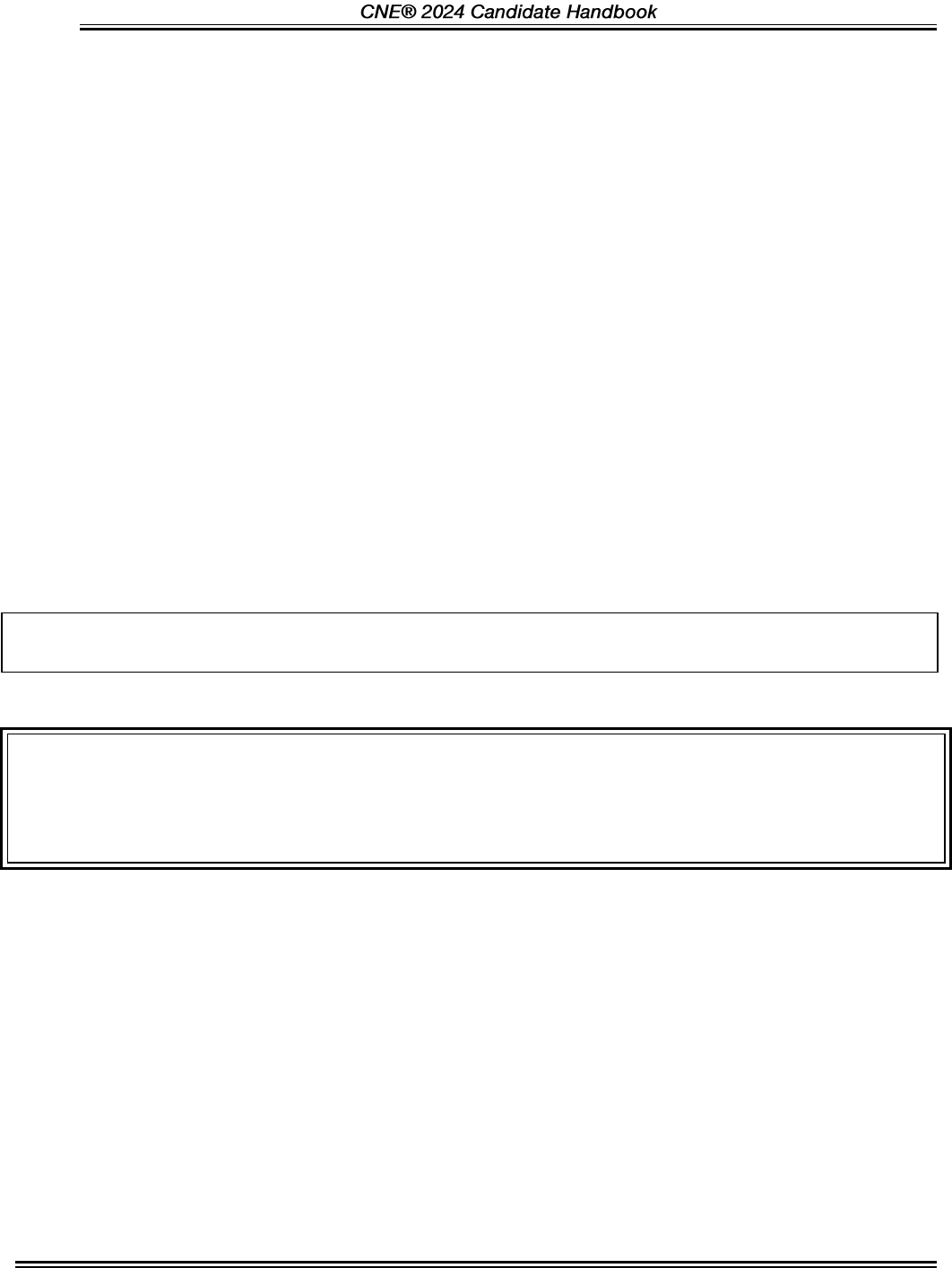
16
6. A nurse educator is the chairperson of the
curriculum committee and desires to make major
curriculum changes. To fulfill the role of change
agent and leader it would be essential for the
nurse educator to initiate which action?
a. Recognize that nurse educators with a spirit of
inquiry about learning are most likely to
support change
b. Include nurse educators affected by proposed
changes in the decision making process
c. Minimize conflict in order to facilitate the
process of change
d. Identify that the utilization of change theory will
allow for a clear cut process for successful
change
Test Blueprint: 5 D
Cognitive Code: Application
7. Which action by a nurse educator
demonstrates scholarly activity?
a. Creating a home page noting professional
achievements
b. Submitting a grant to fund acquisition of a
patient simulator
c. Volunteering clinical expertise to a not-for-
profit organization
d. Coordinating a walk-a-thon to raise funds for
children with cancer
Test Blueprint: 7 C
Cognitive Code: Application
8. A nurse educator is participating on a curriculum
committee involved in a major revision of the
nursing curriculum. Which is the first step?
a. Aligning the new curricular goals with the
mission of the institution
b. Securing faculty representation from another
department on the curriculum committee
c. Ensuring that the faculty members agree on
the program outcomes
d. Developing a grant proposal to secure
external funding for curriculum revisions
Test Blueprint: 4 C 1
Cognitive Code: Analysis
Answer Key:
1.) C 2.)A 3.)D 4.)C 5.)D 6.)B 7.)B 8.) A
Visit www.nln.org/certification/Certification-for-Nurse-Educators/cne
for information about the
Certified Nurse Educator (CNE®) Self-Assessment Examination (SAE)
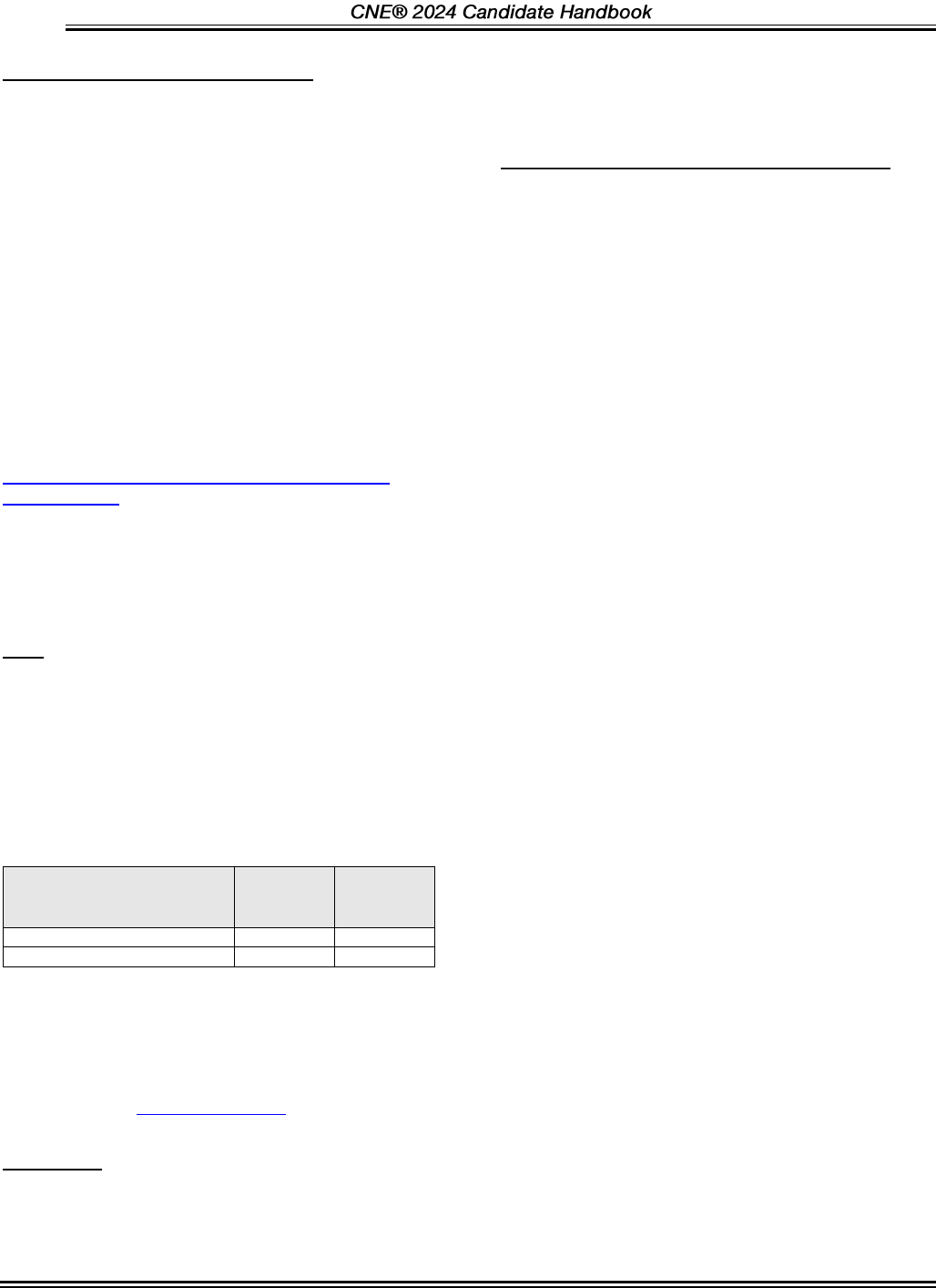
17
APPLYING FOR THE EXAMINATION
It is the applicant’s responsibility to ensure that the online
application and any requested supporting documents are
accurately submitted, that the information provided is
accurate, and that all deadlines are met. Careful attention
to these elements enables prompt and efficient processing.
NLN reserves the right to verify information supplied by
each candidate. An application is considered complete only
if all requested information is accurate; if the candidate is
eligible for the examination; and if correct fees are
submitted. Please note that the first and last names
provided by the applicant during registration must
exactly match the government issued identification
to be used at the testing center. Information on
required identification is described on page 20 of this
Handbook. Any misrepresentation of information shall be
considered grounds for prohibition from testing or
revocation of certification. Candidates must apply and
register for the CNE® examination online at:
www.nln.org/certification/Certification-for-Nurse-
Educators/cne The registration tab can be found on the
left sidebar of the Certification for Nurse Educators (CNE)
home page. Applications will not be accepted via mail or
fax. Do NOT submit examination application or fees if
the eligibility requirements have not been met at the
time of application.
Fees
Candidates must submit the appropriate fee with the
complete examination application, and payment is to be
made using a valid credit card only (Visa, MasterCard,
American Express or Discover). Company checks,
personal checks, money orders and cash are not
acceptable forms of payment and will be returned without
the application being processed. Fees for the certification
exam are as follows:
Certification Exam
NLN
member
Fee*
Non-
member
Fee*
Initial testing
$425
$525
Retest
$425
$525
Please note that the above fees apply to testing within
the continental U.S. and Hawaii. Applicants wishing
to test at a testing center located within one of the U.S.
Territories should contact the NLN’s Academic Nurse
Educator Certification Program at (618) 534-0294 or
arrangements and the applicable fees.
Verification
Information on applications will be verified by authorized
NLN staff who check for accuracy and may verify information
by telephone, letter or other means. All information gained
through verification procedures will be kept confidential
except in instances where the law or professional obligations
require disclosure of facts. Should any information on the
application be found false or materially misleading, the
applicant will be notified and declared ineligible to continue
in the certification process.
Agreement of Authorization & Confidentiality
The ANECP is committed to protecting confidential and/or
proprietary information related to candidates, certificants,
and the examination development and maintenance
process.
Information about individuals who register to take the
examination, as well as their examination results, are
considered confidential. Exam scores are released only to
the individual candidate unless a signed request to release
that information to other parties is provided by the individual.
Information submitted by candidates or certificants in
connection with an application, renewal, or recertification is
considered confidential.
When applying online, candidates will be required to read
and acknowledge understanding of the following Agreement
of Authorization and Confidentiality:
“I have read and understand the information provided in the
candidate Handbook. In making this application, I fully
understand that it is an application only and does not
guarantee certification. I attest by answering “yes” to the
statement “I have read and understand the preceding
information” that I currently meet the eligibility requirements
and I authorize the NLN to make whatever inquiries and
investigations that it deems reasonable to verify my
credentials and professional standing. I understand that
false information may be cause for revocation of this
application without a refund of any fees paid, loss of the
credential (if currently held), or denial as a candidate to take
the examination. I understand that I can be disqualified from
taking or completing the examination, or from receiving
examination scores if the Certification Committee of the NLN
determines in its sole discretion that I was engaged in
collaborative, disruptive or other prohibited behavior during
the administration of the examination. I understand and
agree that if I am certified following acceptance of this
application and successful completion of the examination,
such certification does not constitute NLN’s warranty or
guarantee of my competency to practice as an academic
nurse educator. I understand that the initial certification
period is five years beginning on the date of notification of
passing the exam and ending on December 1
st
of the fifth
year following the date of passing the examination, and I
agree to meet the then-current requirements if I wish to
maintain active certification status thereafter. I further
understand that the governing body has the authority to
change requirements to attain and maintain certification from
time to time. If I am certified, I authorize NLN to include my
name in a list of certified individuals and agree to use the
CNE designation and related NLN trade names, trademarks,
and logos only as permitted by NLN policies. I understand
and agree that the NLN may also use anonymous and
aggregate application and examination data for statistical
analysis. I further agree to abide by the policies and
procedures as set forth in the candidate Handbook.”
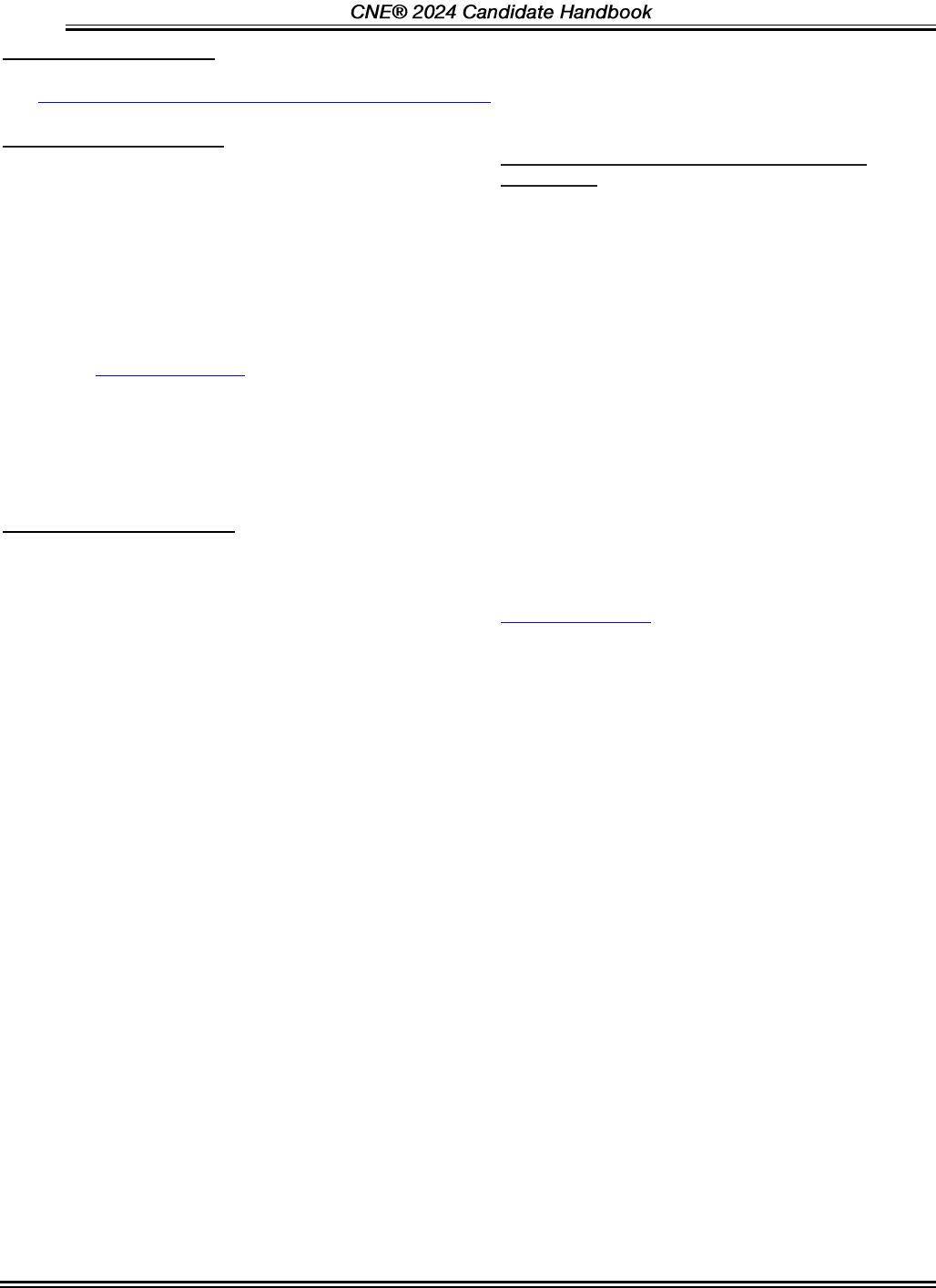
18
Examination Application
Visit www.nln.org/certification/Certification-for-Nurse-Educators/cne for the current test application.
Confirmation of Eligibility
Applicants receive acknowledgement of receipt of their
application via email immediately after the completed
application (including the appropriate fee) has been received
by NLN’s Academic Nurse Educator Certification Program.
Once the application is reviewed, a confirmation notice of
eligibility is sent to the applicant by email (if a usable email
address has been provided). If a confirmation notice is not
received within five business days of finalizing the
registration, the applicant should contact the NLN’s
Academic Nurse Educator Certification Program at (618)
534-0294 or [email protected]. Failure to notify the NLN
about a missing confirmation notice of eligibility will result in
the inability to schedule and sit for the CNE® examination.
The candidate has a 90-day window to schedule and take
the CNE exam.
.
Examination Reapplication
Individuals who were unsuccessful in an examination
attempt may reapply. An individual may take the CNE®
examination a maximum of four times per year or once
every 90 days and not more than once per quarter. An
examination application and examination fee (as per the fee
structure on page 16 of this Handbook) is required for each
retest.
Special Arrangements for Candidates with
Disabilities
Meazure Learning and the NLN comply with the Americans
with Disabilities Act (ADA) and strive to ensure that no
individual with a disability is deprived of the opportunity to
take the examination solely by reason of that disability.
Meazure Learning will provide reasonable accommodations
for candidates with disabilities. Wheelchair access is
available at all established Assessment Centers. Candidates
with visual, sensory or physical disabilities that would
prevent them from taking the examination under standard
conditions may request special accommodations and
arrangements. To request special accommodations and
arrangements, refer to the Credentialing Accommodations
Handbook, available for download on the NLN website. The
Request for Special Examination Accommodations and the
Documentation of Disability-Related Needs forms located in
the Accommodations Handbook, must be uploaded to your
application in the Certification Portal before finalizing the
application. Additionally, the NLN’s Academic Nurse
Educator Certification Program must be notified that a
request for special examination accommodations has been
submitted by calling (618) 534-0294 or emailing
Meazure Learning of acceptance of the accommodation
request, and the applicant must inform Meazure Learning of
the need for special accommodations when scheduling an
examination appointment.
Accommodations are not offered for any testing using Live
Remote Proctoring. The accommodations are best served
by a testing center. For candidates requesting exam
accommodations, the exam must be scheduled at a testing
facility rather than by remote proctor. If you have been
granted an accommodation, you must submit your
scheduling request to Meazure Learning at least thirty (30)
days prior to the date you wish to test.
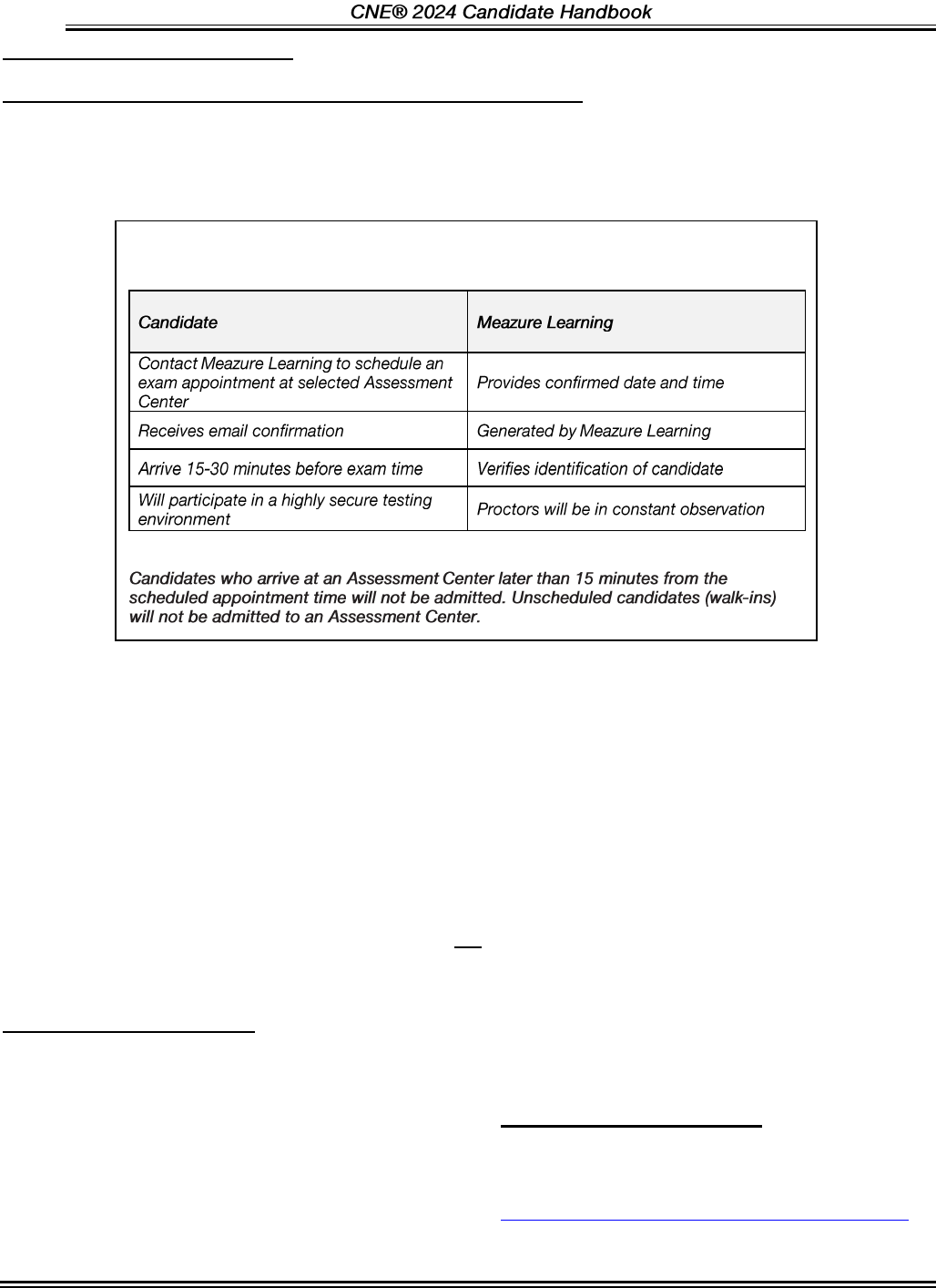
19
EXAMINATION ADMINISTRATION
Scheduling a Computer-Based Examination with Meazure Learning
There is a 90-day window to schedule and take the CNE exam. The Notice to Schedule Examination email contains a web address
and a telephone number for the candidate to contact Meazure Learning. The candidate must be prepared to confirm a date and
location for testing and to provide the unique username and password provided in the scheduling notice email. Examinations are
administered by appointment only, Monday through Saturday, and individuals are scheduled on a first-come, first-served basis.
Table 4 outlines timeframes for scheduling appointments:
There are two ways to schedule an appointment for the computer-based Certified Nurse Educator Examination:
Online Scheduling: The candidate will receive a Notice to Schedule email from Meazure Learning. This email will provide
a username and password which will allow the candidate to schedule an exam date.
o Go to the web link provided in the Notice to Schedule email
o Enter the username and password provided in the email.
o If special accommodations are being requested, the Request for Special Examination Accommodations
must be submitted through the Certification Portal at the time of application. To schedule your examination,
contact Meazure Learning at (919) 572-6880 and notify the candidate services representative that you have
requested the accommodation. If you have been granted an accommodation, you must submit your scheduling
request to Meazure Learning at least thirty (30) days prior to the date you wish to test.
OR
Telephone Scheduling: Call Meazure Learning at (919) 572-6880 to schedule a testing appointment.
Examination Times and Days
The Certified Nurse Educator examination is delivered by
computer at Meazure Learning Assessment Centers
throughout the United States. The examination is
administered by appointment only Monday through
Saturday. Appointment starting times may vary by location.
Candidates are scheduled on a first-come, first-served
basis. The examination is not offered on the following
holidays:
New Year’s Day
Martin Luther King, Jr Day
Memorial Day
Independence Day
Labor Day
Thanksgiving (and the following Friday)
Christmas Eve
Christmas Day
Assessment Center Locations
Meazure Learning Assessment Centers have been selected
to provide accessibility to candidates in the global arena. A
current listing of Meazure Learning Assessment Centers is
available at this link on the Meazure Learning website:
www.assessments.meazurelearning.com/test-site-cities/
The exam is also offered by remote on-line proctor.
Additional details are available on page 22.
Table 4
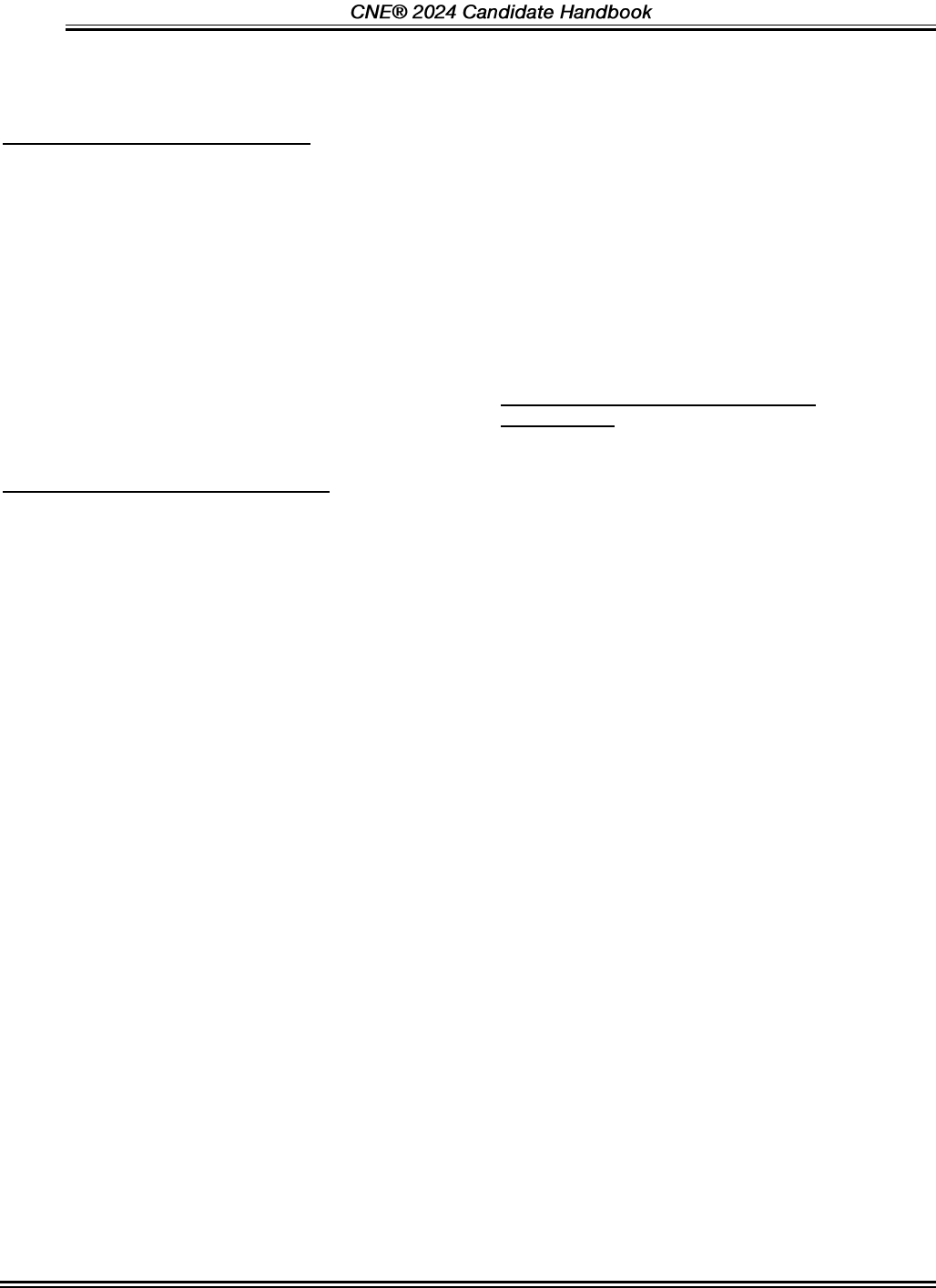
20
Examination Appointment Changes
Please note that rescheduling refers to a process that occurs
once you have scheduled a testing date and subsequently
wish to change or amend the date, time, or location of your
scheduled exam. You may reschedule a testing appointment
up to two (2) days in advance of your testing appointment.
Reschedule requests are not accepted less than two (2)
days of your scheduled testing appointment. To reschedule
your exam, click on the scheduling link in the Meazure
Learning Notice to Schedule email to log back into the
scheduling system with the provided username and
password. Once you have logged in, click on the link to
reschedule. A $50 non-refundable fee will apply to all
rescheduled exams; the fee must be paid online at the time
of the request.
Missed Appointments and Forfeitures
A candidate will forfeit the application and all fees paid to
take the examination under the following circumstances:
The candidate wishes to withdraw the application
after the refund application deadline (see
Withdrawal of Examination Request Form at the
end of this handbook).
The candidate wishes to reschedule an
examination but fails to contact Meazure Learning
at least two business days prior to the scheduled
testing session or fails to reschedule it within the
same testing period.
The candidate appears more than 15 minutes late
for an examination appointment.
The candidate fails to report for an examination
appointment.
The candidate fails to schedule an examination
appointment within the 90-day testing window.
Candidates who forfeit their application and fees for any of
these reasons will be required to submit a new application
and examination fees in order to be eligible to sit for the
examination.
Inclement Weather, Power Failure or
Emergencies
In the event of inclement weather or unforeseen
emergencies on the day of an examination, Meazure
Learning will determine whether circumstances warrant the
cancellation, and subsequent rescheduling, of an
examination. The examination usually will not be
rescheduled if the Assessment Center personnel are able to
open the Assessment Center. If power to a testing center is
temporarily interrupted during an administration, the
examination will restart where the candidate left off to allow
the candidate to continue the examination.
Candidates may visit Meazure Learning’s website for
information about test site closures or delays. Every attempt
is made to administer the examination as scheduled;
however, should an examination be canceled at an
Assessment Center, scheduled candidates will receive
notification regarding rescheduling or reapplication
procedures.
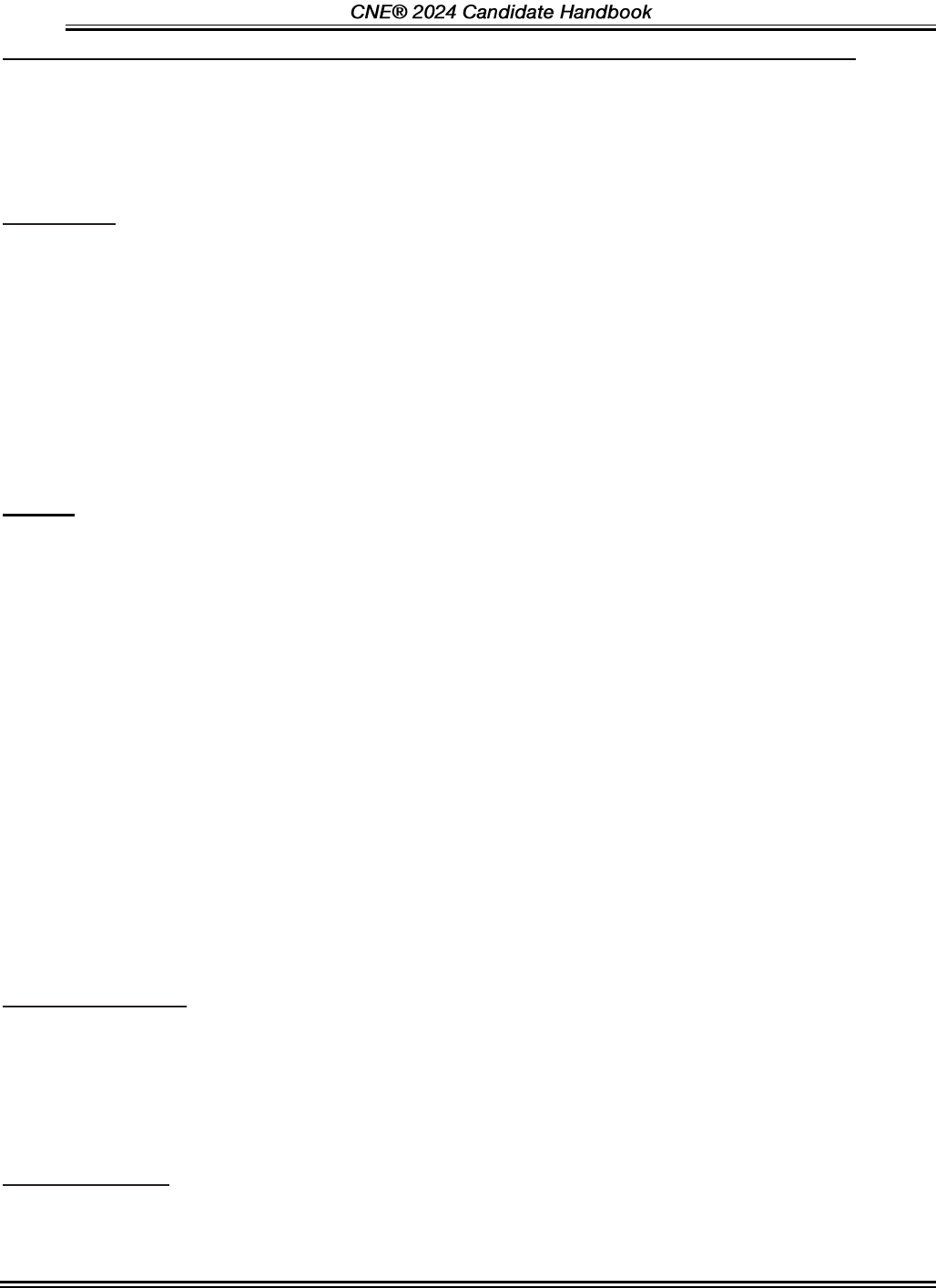
21
TAKING A COMPUTER-BASED EXAMINATION AT A MEAZURE LEARNING ASSESSMENT CENTER
The CNE examination is given by computer at a Meazure Learning Assessment Center. On the day of the examination,
candidates are to report to the Assessment Center no later than the scheduled examination time. Live on-line proctored
test administration is also available. Refer to page 23 of this handbook for information on the remote proctored exam
administration.
Identification
To gain admission to the Assessment Center for an examination, the candidate must present a valid, government-issued photo
ID (e.g., driver's license, passport, state-issued ID card) on exam day. Please ensure that your first and last name on the valid,
government-issued photo ID EXACTLY match your first and last name as they appear on the scheduling screens. If your first
and last names are incorrect, please contact Meazure Learning at (919) 572-6880. If you have more than one last name listed on
your government-issued ID, the same last names must be reflected on your confirmation email.
CANDIDATES MUST HAVE PROPER IDENTIFICATION IN ORDER TO GAIN ADMISSION TO AN ASSESSMENT CENTER
FOR COMPUTER-BASED TESTING.
Failure to provide appropriate identification at the time of the examination is considered a missed appointment, and the
examination fee will not be refunded.
Security
Meazure Learning maintains examination administration and security standards designed to ensure that all candidates are
provided the same opportunity to demonstrate their abilities. The Assessment Center is continuously monitored by audio and
video surveillance equipment for security purposes.
Candidates who voluntarily exit the examination at any point during the test will be considered finished, and their test will be
scored. They will not have the opportunity to restart the examination or to answer incomplete items.
The following security procedures apply during the examination:
Examinations are proprietary. Cameras, notes, tape recorders, pagers, cellular phones or any other device that could be
used to record all or part of the examinations are not allowed in the examination room.
Calculators are not permitted.
Guests, visitors or family members are not allowed in the examination room or reception areas.
Candidates may be subjected to a metal detector scan upon entering the examination room.
No personal items, valuables, or weapons are to be brought to the Assessment Center.
Practice Examination
At the testing carrel, the candidate will be instructed on-screen to enter the username and password provided in the Scheduling
Confirmation Notice (Admission Ticket). Prior to attempting the examination, the candidate will be given the opportunity to practice
taking an examination on the computer. The time used for this practice examination is NOT counted as part of the examination
time or score. When the candidate is comfortable with the computer testing process, the candidate may end the practice session
and begin the timed examination.
Timed Examination
Following the practice examination, the actual timed examination will begin, with instructions for taking the examination provided
on-screen. Time spent on the examination will be monitored on the computer screen. The candidate will have 3 hours to complete
the examination. The examination will terminate if testing exceeds the time allowed.
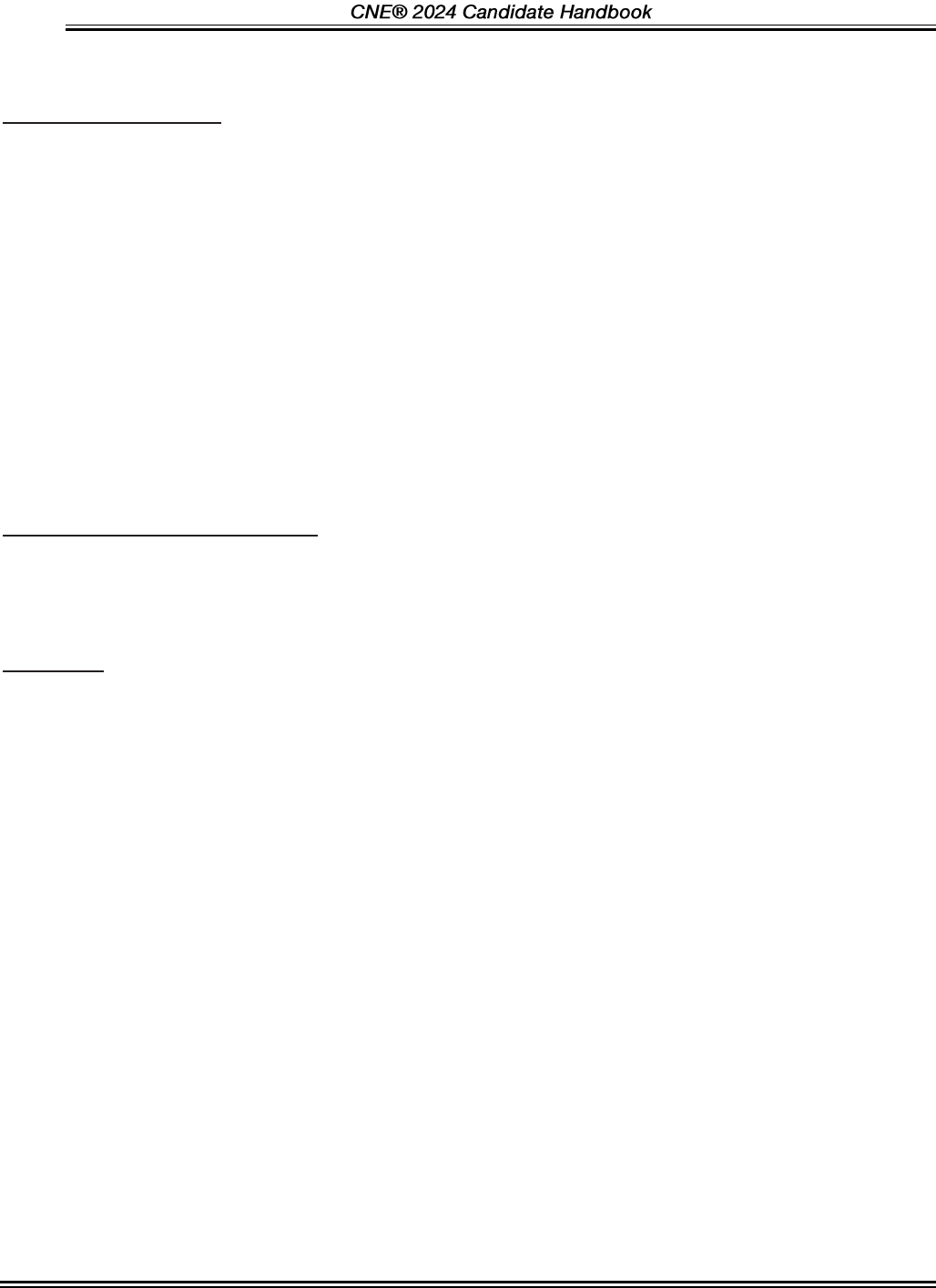
22
Examination Restrictions
No personal belongings are allowed in the Assessment Center.
During check-in, candidates are provided with a white board and dry erase pen to use during the examination, but which
must be returned to designated Assessment Center personnel at the completion of testing. If these items are not returned,
the candidate will not receive a score report.
No documents or notes of any kind may be removed from the examination room.
No questions concerning the content of the examination may be asked during the examination.
Eating, drinking or smoking are not permitted in the Assessment Center.
Candidates may take a break to visit the restroom or reception area during the examination, but no additional time will be
allotted to make up for time lost during such breaks.
The computer will keep official time.
Copyrighted Examination Questions
All examination questions are the copyrighted property of the National League for Nursing. It is forbidden under federal copyright
law to copy, reproduce, record, distribute or display these examination questions by any means, in whole or in part, or to prepare
any derivative work based on them. Doing so may subject a candidate to severe civil and criminal penalties.
Misconduct
Individuals who engage in any of the behaviors listed below may be dismissed from the examination. In such instances, the
candidate’s score will not be reported, and examination fees will not be refunded.
Examples of candidate misconduct include:
Failing to follow the test administrator’s directions
Creating a disturbance, being abusive, or being otherwise uncooperative
Using electronic communications equipment such as pagers or cellular phones while taking the exam
Giving or receiving help during the examination or being suspected of doing so
Attempting to record examination questions or make notes
Attempting to take the examination for someone else
Removing or attempting to remove scratch paper from the test center
Using prohibited aids, such as reference materials, mechanical listening devices, or recording or photographic devices
Attempting to tamper with the operation of the computer
Leaving the testing room without permission
Sharing information about the test and test questions with any unauthorized persons
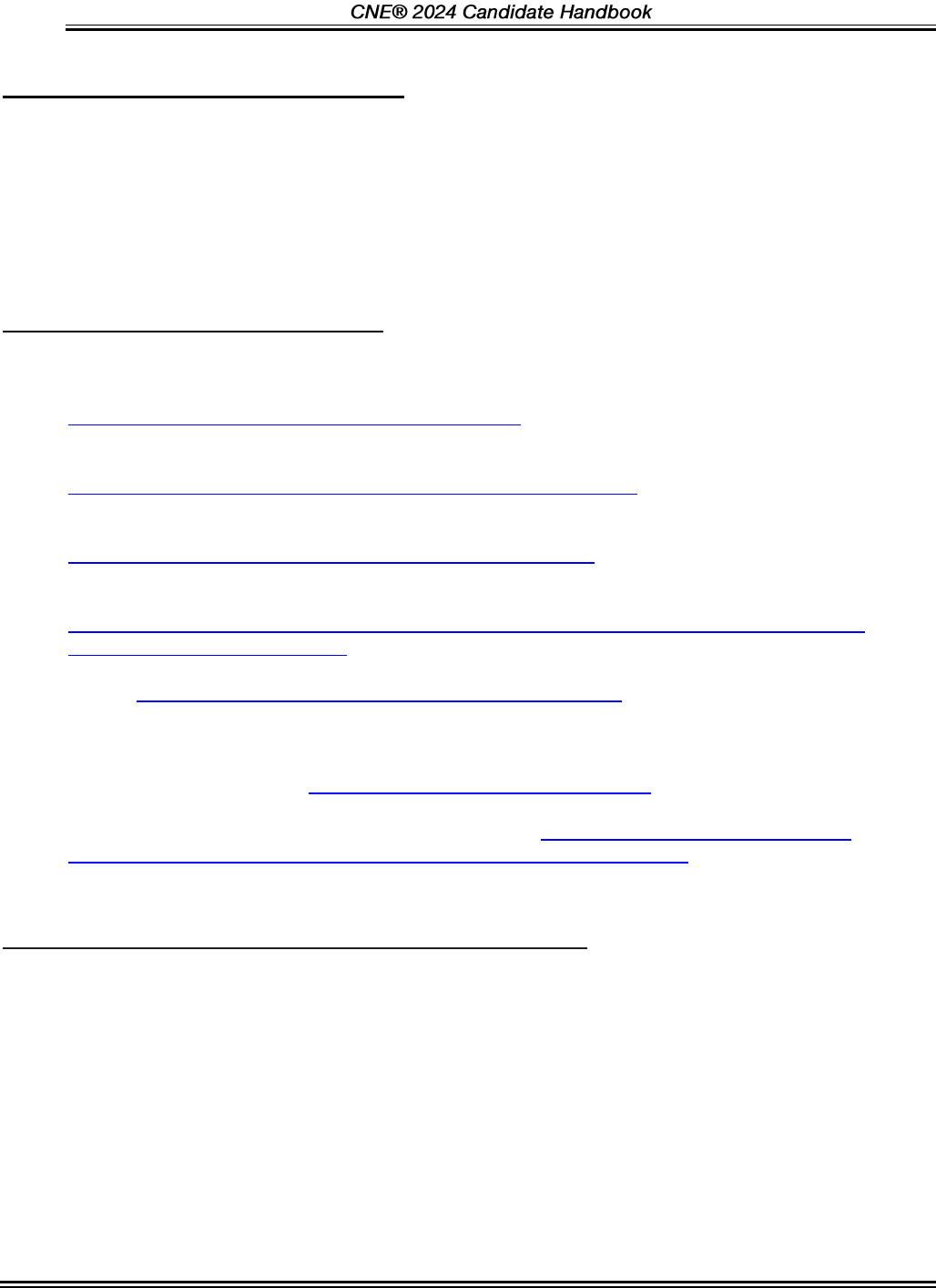
23
Live Online Proctored Test Administration
The CNE exam can be taken at a testing center, or by live online proctored (remote) administration.
Meazure Learning partners with Proctor U for the remote testing option. The Notice to Schedule email
will include information about both options. The scheduling confirmation email will contain detailed
instructions for the option selected. If planning to test by Remote Live Proctor, it is essential that the
technical requirements be tested prior to the examination. Breaks are not allowed during remote
testing.
Links for information on remote testing:
Live+ Resource Center
https://www.proctoru.com/live-plus-resource-center
Help Center Link
https://support.proctoru.com/hc/en-us/categories/115001818507
System Requirements
https://www.proctoru.com/live-plus-resource-center#system
Exam Expectations
https://support.proctoru.com/hc/en-us/articles/360043127892-What-am-I-allowed-and-not-
allowed-to-do-during-my-exam-
Video: https://meazurelearning.wistia.com/medias/x8sicg86fm
Links specific to the Guardian browser.
Guardian download page: https://guardian.meazurelearning.com/
Guardian information on the ProctorU support page: https://support.proctoru.com/hc/en-
us/sections/9979847689229-Guardian-Proctoring-Browser-Resources
ProctorU Platform Equipment Requirement Update: May 1, 2023
To align with Microsoft's end of support for the Windows 8.1 operating system and below, Meazure
Learning will be updating our Equipment Requirements for exams proctored through the ProctorU
Platform to better support our candidate's testing experience. Going forward, the minimum
requirement for PC users will be Windows 10 to align with the operating system Microsoft is
supporting.
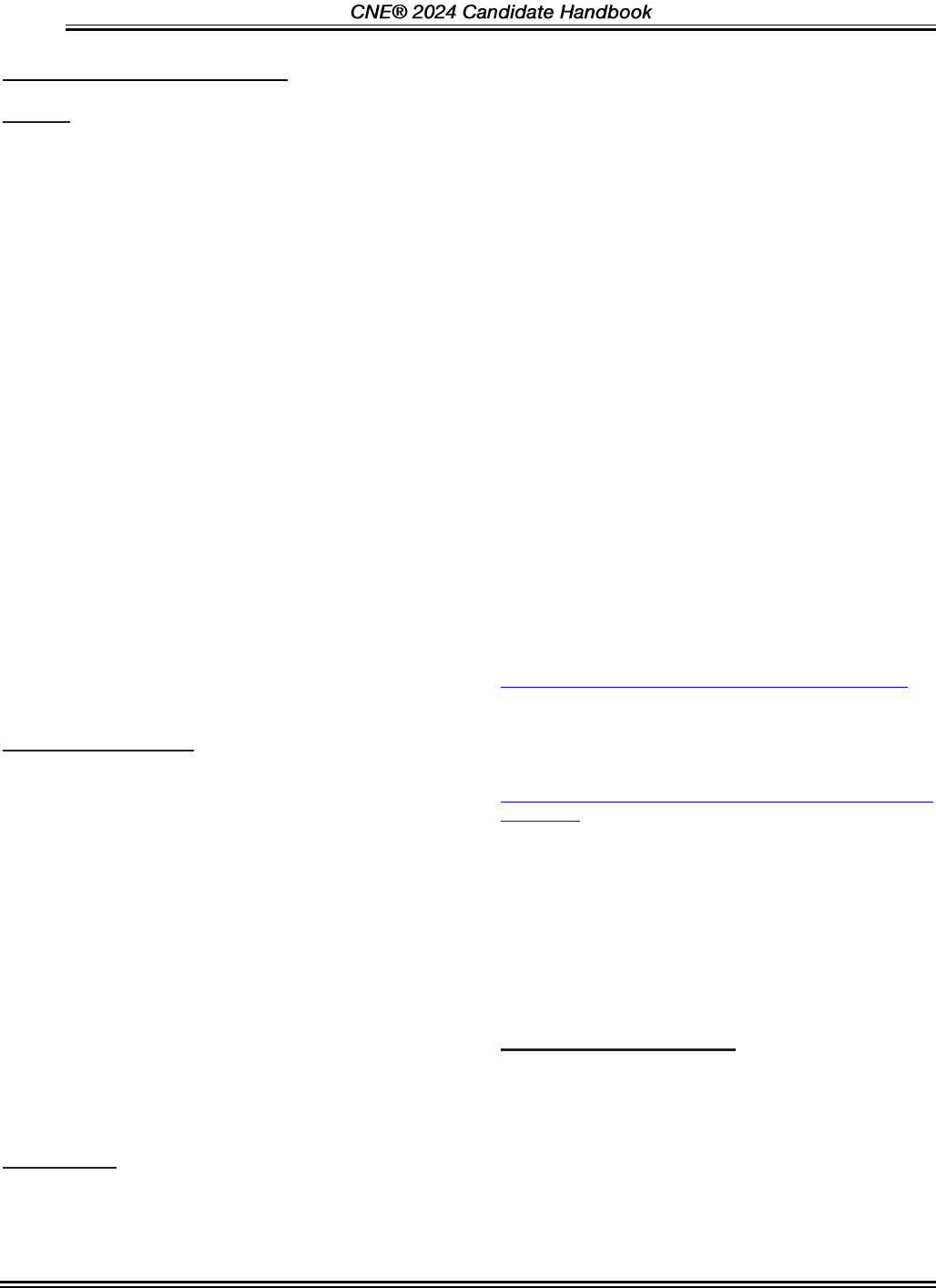
24
FOLLOWING THE EXAMINATION
Scoring
The passing score for the CNE® examination was
established via a systematic procedure (i.e., a standard
setting study) that employed the judgment of academic
nurse educators representing various geographical areas
and program types. The methodology for the passing point
study is known as a modified Angoff technique, in which
content experts evaluated each item on the examination to
determine the score that would best differentiate minimally-
competent academic nurse educators deserving to be
awarded certification from those who have not
demonstrated sufficient knowledge. Passing the
examination is determined by the amount of knowledge the
candidate displays in comparison to this standard, and not
in comparison to other candidates taking the examination.
Consistency of the passing point (i.e., the number of
correct responses required to pass) for future examination
forms is assured through statistical equating procedures.
The Certification program uses multiple forms of the exam.
The passing score may vary depending on which form of
the exam was administered. Although the number of
correct responses required to pass (the passing point) may
vary depending on the difficulty of the examination form,
the same amount of knowledge has been demonstrated for
scores at that passing level.
The CNE® examination consists entirely of multiple-choice
items. The number of items answered correctly determines
the score. Since there is no penalty for incorrect answers, it
is to the candidate’s advantage to answer every item.
Determining Pass-Fail
Content area (e.g. Facilitate Learning) scores on the score
report are not used to determine pass-fail outcomes. They
are only provided to offer a general indication regarding the
performance in each content area. The examination is
designed to provide a consistent and precise determination
of the overall performance and is not designed to provide
complete information regarding performance in each
content area.
Examinees should remember that areas with a larger
number of test questions will affect the overall score more
than areas with a fewer number. The precision and
consistency of scores diminishes with fewer questions,
therefore, content area scores should be interpreted with
caution, especially those that correspond to content areas
with very few questions. The Certification program uses
multiple forms of the exam. The passing score may vary
depending on which form of the exam was administered.
Score Report
After completing the examination, candidates are instructed
to report to the examination proctor to receive the score
report. Candidates will receive score reports prior to leaving
the Assessment Center, after turning in the white board and
marker that was provided. The score report will indicate
“pass” or “fail.” Additional detail is provided in the form of raw
scores by major content category. A raw score is the number
of questions answered correctly. Pass/Fail status is
determined by the raw score. Even though the examination
consists of 150 questions, the candidate’s score is based on
only 130 questions since, as noted previously, 20 questions
are being pretested for use as a score item on future
examination forms.
The content area scores (e.g., Facilitate Learning, etc.) on
the score report are not used to determine pass-fail
decision outcomes. They are only provided to offer a
general indication regarding examinee performance in each
area. The examination is designed to provide a consistent
and precise determination of an examinee’s overall
performance and is not designed to provide complete
information regarding your performance in each content
area.
Examinees should remember that areas with a larger
number of test questions will affect the overall score more
than areas with a fewer number. The precision and
consistency of scores diminishes with fewer questions,
therefore, content area scores should be interpreted with
caution, especially those that correspond to content areas
with very few questions.
After the exam, the score report can be viewed by logging
into the Meazure Learning Score Report Portal:
assessments.meazurelearning.com/ScoreReportPortal/
If you have not accessed this site before, click Request
Account on the login page. Generic registration instructions
for accessing the Score Report Portal can be found here:
assessments.meazurelearning.com/ScoreReportPortal/instr
uctions.pdf
If you have any questions with regards to accessing the
website, please contact Meazure Learning at (919) 572-
6880.
Requests for Hand Scoring
Because the computer instantly records the responses
provided by the candidate, hand scoring is not relevant for
those who take the examination via computer-based testing
(CBT). No hand scoring is provided for computerized
examinations.
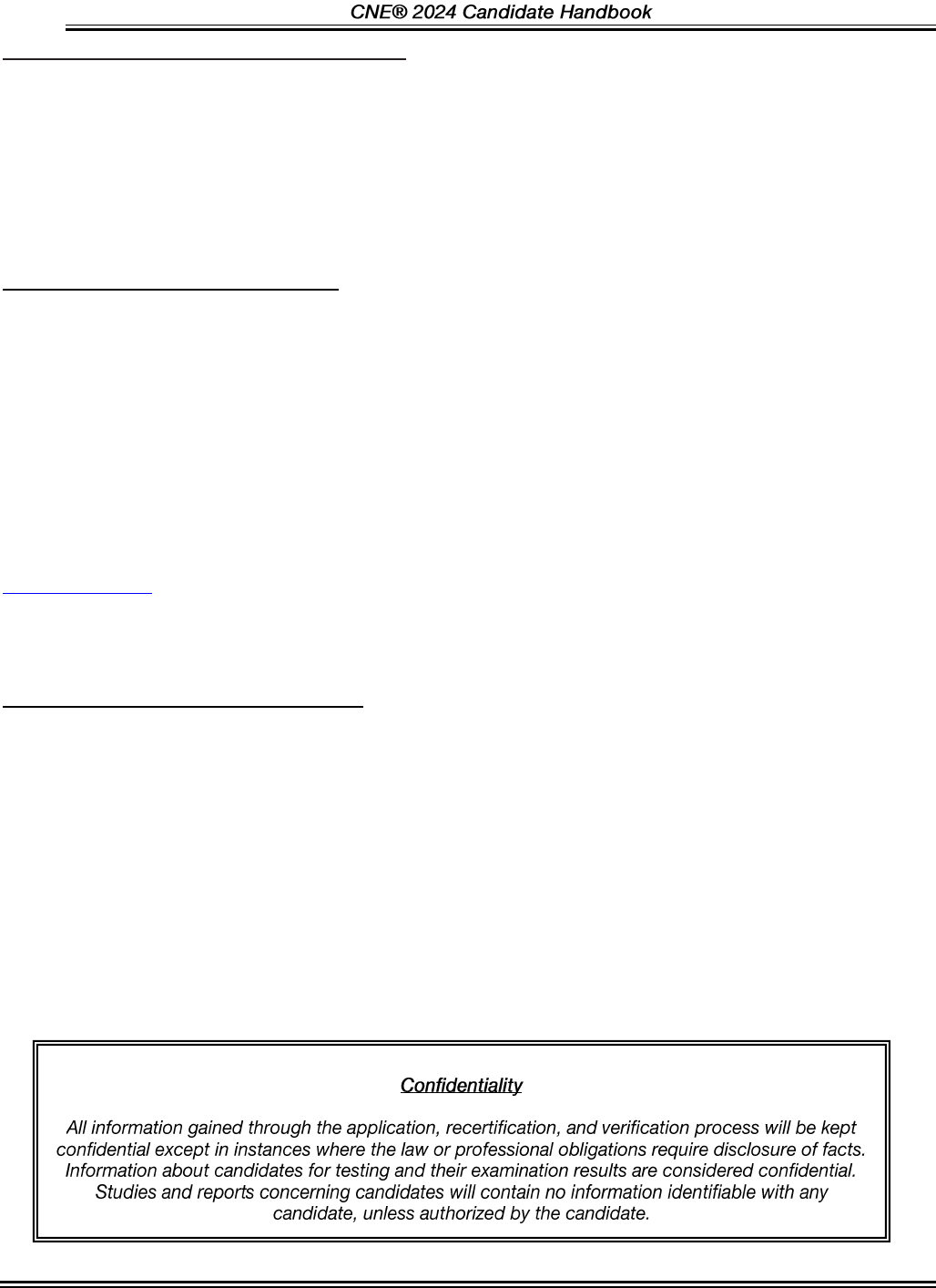
25
Scores Cancelled by NLN or Meazure Learning
NLN and Meazure Learning are responsible for the integrity
of the scores they report. On occasion, occurrences, such
as computer malfunction or misconduct by a candidate, may
cause a score to be suspect. NLN and Meazure Learning
are committed to rectifying such discrepancies as
expeditiously as possible. NLN may void examination results
if, upon investigation, violation of its regulations is
discovered.
Candidates Who Pass the Examination
Candidates who pass the Certified Nurse Educator
examination are allowed to use the designation “CNE” after
their name upon receiving an official passing test score. This
includes receiving an onsite score report at the testing
center. Proper use of the credential is typically conveyed as
highest degree earned, license, certification, and fellowship
appointments. Candidates will have the option to download
and print a certificate through the NLN’s Certification Portal.
Candidates will receive a CNE® pin from the NLN’s
Academic Nurse Educator Certification Program via U.S.
postal mail approximately 4 to 6 weeks after the passing
score is achieved. To avoid mailing delays, verify the correct
mailing address is reflected in the Certification Portal. If
assistance is needed with making updates, email
[email protected] or call (618) 534-0294. NLN reserves
the right to recognize publicly any individual who has
successfully completed the CNE® certification examination
and earned the certified nurse educator credential.
Candidates Who Do Not Pass the Examination
Candidates who do not pass the examination but wish to
pursue certification must submit a new application and the
retest examination fee (see page 17). Such individuals are
encouraged to review rules of eligibility before submitting a
new application and fee. Registration for retesting will be
available online after a ninety day waiting period.
An individual may take the CNE® examination a
maximum of four times per year or once every 90 days
and not more than once per quarter.
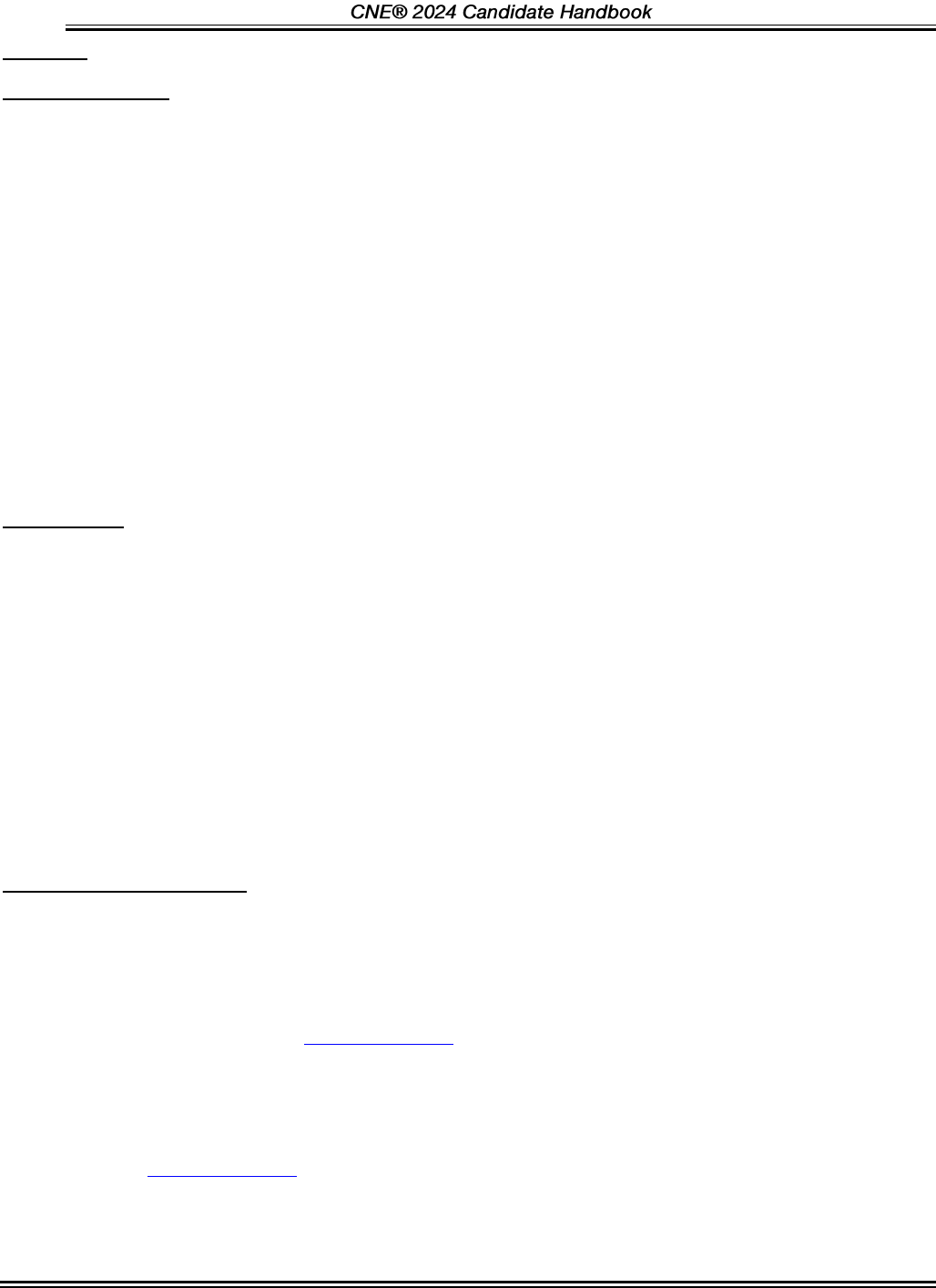
26
POLICIES
Request for Appeal
Although the score received on an examination may not be appealed, candidates may appeal decisions made by the Certification
Commission regarding eligibility, ethical behavior, or violations of stated policies and expectations. Such appeal requests must
be received in writing within 30 days of notification of the decision being appealed, and supporting documentation must accompany
the written request in order for it to be considered. Requests for an appeal must be mailed to: National League for Nursing,
Academic Nurse Educator Certification Program, 2600 Virginia Avenue NW, 8
th
Floor, Washington, DC 20037.
Appeals Process*
To appeal for a waiver of eligibility requirements, these steps will be followed:
1. A formal communication will be sent by the potential candidate explaining the rationale for appealing to waive the
requirements. This can be submitted electronically to the Program Coordinator or to the Director of Credentialing.
2. The Director will read and respond to the appeal.
3. The letter will be forward to the Appeals Committee for review and discussion.
4. A decision is made by the Appeals Committee to approve the waiver or deny it.
5. The Chairperson of the Appeals Committee will communicate the decision to the candidate.
*Please note that there is no appeal process for a candidate who wishes to “appeal” a test score. If a candidate wishes to have
the examination hand scored, or rescored in any way, the candidate must contact the test vendor who supplied the
administration of the exam. If an error in scoring is found, the test vendor will contact the Certification Program with the
information.
Refund Policy
Refunds are made at the discretion of the NLN Academic Nurse Educator Certification Program. In order to receive a partial
refund, the Withdrawal of Examination Request (located at the end of this Handbook) must be received by the refund application
deadline. All withdrawal of examination requests must be received seven days prior to the end of the 90-day eligibility period. If
mailed, the submission must be postmarked by the refund application date. No refunds will be issued to any candidates
requesting to withdraw their examination application after the refund application deadline.
A non-refundable processing charge of $100 will be incurred by candidates who withdraw their examination request.
Candidates who withdraw their application must repeat the certification registration process in its entirety, including the full
payment, to sit for a future certification examination.
Candidates will forfeit the examination fee if they fail to report for an examination appointment, arrive more than 15 minutes late
for an appointment, fail to present appropriate identification on the day of the examination, or fail to schedule an examination
appointment within the 90-day testing window. Such candidates may reapply by submitting a new application and full
examination fee.
The refund policy is subject to change without prior notice.
Extending Testing Eligibility
Individuals may revise their examination test window by extending their eligibility period for an additional ninety days. The testing
period can be extended only one time. The fee to extend the eligibility is $50. Please be aware that the NLN must receive the
request to extend an exam session at least seven business days prior to the original exam date, or the end of the current test
window. If this is not done, the candidate will be marked absent and forfeit all registration fees paid.
Candidates who wish to extend their eligibility period and have NOT scheduled an appointment with Meazure Learning are to
submit an email request for extension to [email protected]. All such requests must be received by the ANECP office seven
business days prior to the end of the eligibility period. When the eligibility extension has been confirmed, the invoice for $50 must
be paid through the Certification Portal to finalize the extension.
Candidates who wish to extend their eligibility period and HAVE scheduled an appointment with Meazure Learning must first
cancel the scheduled exam with Meazure Learning and pay Meazure Learning’s cancellation/reschedule fee. Refer to Meazure
Learning’s Notice to Schedule email for instructions. When the exam is cancelled, submit a request for an extension of the eligibility
window by email to [email protected]. The email request must be received at least seven business days prior to the end of
the eligibility period. When the eligibility extension has been confirmed, the invoice for $50 must be paid through the Certification
Portal to finalize the extension.

27
Ethics Case Procedure
The CNE Commission recognizes and implements as a framework the American Nurses Association (ANA) Code of Ethics
(http://ethics5.com/a/ana-code-of-ethics-book-w735/) and the NLN Ethical Principles for Nursing Education document
(http://nursingworld.org/DocumentVault/Ethics_1/Code-of-Ethics-for-Nurses.html). A procedure is available to CNE® applicants
and certificants to resolve ethics charges and complaints. Any person, group, or, in appropriate cases, the NLN ANECP, may
initiate an ethics case and act as a complainant. A complainant other than the ANECP must: contact the Certification Director
and request an Ethics Charge Statement form; complete the information requested on the Charge Statement; and submit the
completed Charge Statement to the Certification Director. Each Ethics Charge Statement must include a detailed written
description of the factual allegations supporting the ethics charge(s).
Individuals who are found to have violated ANECP policies may be subject to one or more of the following disciplinary and/or
remedial actions:
• Denial of application/reapplication
• Requirement to take corrective action(s)
• Private reprimand and censure
• Public reprimand and censure
• A term of certification probation
• Suspension of any NLN certification for six (6) months to two (2) years
• Revocation of any NLN certification
Authorized Use of CNE
Use of the CNE credential is limited strictly to those individuals who are CNE® certificants in good standing.
Each CNE® certificant accepts and assumes sole responsibility for understanding and satisfying all applicable organizational
and legal requirements related to the use and/or display of the Certification Mark. Among other requirements, each certificant is
responsible for ensuring that the use of any Certification Mark in professional and business-related materials (e.g., stationery,
signs, business cards, advertisements) is consistent with the policy of the ANECP, and is not in conflict with applicable laws.
NLN assumes no responsibility concerning the interpretation or application of such legal requirements.
NLN shall not be liable or otherwise responsible for any claims, complaints, suits, or damages whatsoever, relating to the use of
the Certification Mark, or in connection with the use of such mark.
Comments about Operations of the Certification Program
All comments about the management of the NLN certification program should be directed to the director of the program. These
comments may be made orally, by electronic mail, or via postal mail. Each comment will be addressed and each will receive a
response within 7 days of its receipt. If deemed necessary, the comment, at the discretion of the director, may be escalated to the
NLN administrative officer over the cetification program for resolution..

30
WITHDRAWAL OF EXAMINATION REQUEST
Directions:
A candidate must use this form to request to withdraw their application to sit for the Certified Nurse Educator
examination. All withdrawal of examination requests must be received seven days prior to the end of the
eligibility period. A $100 processing fee will be incurred by the candidate. (Subject to change without prior
notification.)
Name: ______________________________________________________________________________________
Candidate ID Number: __________________________________________________
Address:____________________________________________________________________________________
City: ________________________________________ State: ______ Zip/Postal Code: _______________
Telephone: ( _____ ) _________________________________________
Email: _____________________________________________________
I hereby request to withdraw my application for the Certified Nurse Educator examination. I have read and
understand the refund policy.
____________________________________________ __________________
Candidate Signature Date
Return this form to:
or
National League for Nursing
Academic Nurse Educator Certification Program
2600 Virginia Avenue NW, 8
th
Floor
Washington, DC 20037
If you have any questions, please contact us at: (618) 534-0294 or certification@nln.org
